#[ he has So many issues that he chooses to ignore and repress rather than confront
Explore tagged Tumblr posts
Text
forever normal ab how normal brook is ab putting his everything into being a strawhat and how little self worth/care he has in grand scheme of things--
#[ ooc. ] ─ ♪ 《 from tomorrow to the future 》#[ been slowly working on a fic exploring brooks 50 years in isolation and he is sooo#[ normal </3#[ he has So many issues that he chooses to ignore and repress rather than confront#[ canonically only reason man still alive is for laboon#[ but if luffy ask him to die he would in a non-existing heartbeat#[ biting shaking dead peepaw with issues#[ once again encouraging my propaganda that one does not leave 45-50 years of isolation without some major issues#[ 45 years and his first social interactions were with people trying and succeeding in stealing his shadow/beating him up </3#[ sighs#[ everyday i wake up and feel extremely normal ab old op characters
8 notes
·
View notes
Text
Shigaraki, the League and “Redemption”
(In this post: 1700 words about how much I feel like stories/meta in which Shigaraki is rescued or redeemed miss the entire point of Shigaraki.)
It's a big open question how much of Shigaraki's backstory was engineered by All For One. We're not even sure if AFO is the villain who killed Nana's husband, the event that kicked off the entire downward spiral of the Shimura family, much less what degree of involvement he had in Tenko's manifestation of Decay. There's a tremendous amount of well-thought-out, interesting meta and fic about what will happen when Shigaraki finds out the truth, whether he can or should still be redeemed as he currently stands, or how Tenko might have been saved from ever becoming Shigaraki to begin with. While I have read and enjoyed quite a lot of those theories and stories, I still find myself bothered by the prevalence of that line of thought because it ignores the fact that hero society stands condemned regardless.
Whether or not AFO gave Tenko the Decay quirk knowing what would happen, whether he found out about Tenko the night of the accident or never lost track of Kotaro from the very beginning, in truth, none of that matters to the narrative of the League on the whole. Nothing about Shigaraki's past has any bearing on the pasts of the other members. Trying to decide how to "save" Shigaraki avoids the fact that he is the leader of the League of Villains and their pain still stands regardless of their leader's history.
You cannot act as though saving Shigaraki--with All Might, Inko, Izuku, Eraserhead, anyone--would redeem hero society, because Shigaraki is not hero society's only victim. He's not even its most straightforward one! The condemnation he articulates of the world he lives in can't be addressed by him realizing he was manipulated by AFO all along or getting a good therapist in prison, because the world he lives in has failed a good many more people than just him.
Let's break it down.
The League Members
Twice fell through the cracks because of a lack of social support after his parents were killed in a villain attack. He was just a teenager back then--what arrangements were made about where he was going to live? If he was old enough that foster care/being placed in a group home wasn't a good option, did he instead have a stipend from the government? Where was the social worker who should have been overseeing his case? Where was his homeroom teacher when he dropped out of school? What support should have been available when he wound up homeless on the streets? Heroes stop villains and are rewarded both socially and monetarily for doing so, but the much more difficult and involved work of dealing with the fallout from those battles is clearly undervalued, badly so, in comparison. Hero society, which prioritizes glamorized reaction over everyday prevention, failed Bubaigawara Jin.
Spinner had the wrong kind of face. X-Men-style mutant discrimination left him isolated and alienated, shunned by the inhabitants of his backwater hometown because of his animal-type quirk. To say nothing about the threat of violent hate crimes implied by the existence of a KKK analogue! But it goes further than just the bigotry of his neighbors--Spinner's quirk was also unremarkable, meaning that, in a society that prizes flashy and offense-based quirks in its heroes, Spinner would have had few if any role models. Given how many heroes there are, it seems strange to consider that there isn't a single straightforward heteromorph for Spinner to idolize, but given how strongly he latches onto first Stain's warped ideals and later Shigaraki's nihilistic grandeur, Spinner is clearly a young man desperate for a role model--if a hero that fit the bill existed, he wouldn't be a villain today. So he's failed directly by his community for their bigotry and indirectly by society for the way it told him, in a thousand ways big and small, that Iguchi Shuuichi was not a person worth valuing.
Toga had the wrong kind of quirk. It's true that, more than anyone else in the League, she feels like a character who would always have struggled with mental stability, even with the best help imaginable--but she didn't get the best help imaginable, did she? She got parents who called her a freak, who berated a child barely into grade school about how unnatural and awful the desires she was born with were. She was put into a quirk counselling program that apparently only caused her to feel more detached from society. If Curious' characterization of quirk counselling is at all accurate, it seems to focus not on how to manage one's unusual or difficult quirk in healthy or productive ways, but rather on stressing what society considers "normal," on teaching its participants how to force themselves into that mold. Hero society wants people with different needs to learn how to function like "normal" people; it is unwilling to look for ways to accommodate such people on a societal level. Toga Himiko was failed by a society that demonized and othered her for a trait that she did not choose and innate desires that she never asked to experience.
And then, most prominently of all*, there's Dabi. We all know where the big Dabi backstory mystery is going, and his is the most open condemnation of hero society of them all. Dabi was raised on a heady cocktail, parental abuse mixed liberally with unquestioned acceptance of the fundamental importance of having a powerful quirk. Whatever else can be said of Endeavor's path to redemption, the old Enji is emblematic of everything wrong with hero society: the fundamental devaluing of those without power, the fervent strain to push oneself past one's limits over and over and over again, regardless of the consequences to your health or your relationships, the practice of raising children to glorify a dangerous profession that fights the symptoms of societal ills rather than the root causes. The ugly secrets hidden in the Todoroki house are the ugly secrets hidden within hero society's ideals, and because he embodies those ideals so thoroughly, of course Endeavor is lionized and well-paid by a society that never had to see Todoroki Touya's scars.
Mirror of Reality
All of these issues map to things in real life, and I don't only mean in a vague, universal sense--I mean they reflect on specific and observable Japanese problems. Read up on koseki family registries and consider how the dogged insistence on maintaining them impacted the Shimura family, tracked down by a monster. Look into societal bias against orphans and imagine how it shaped peoples' reactions to teenaged Jin and his alleged 'scary face.' Read up on how Japan approaches mental and physical disabilities, on what it regularly does to homeless camps, on what responses get trotted out when someone comes forward with a story about closeted abuse. The League embodies these issues in indirect, sometimes fantastical ways, but they're not what I would call subtle, either; there's a reason the generally poor, disenfranchised League members are contrasted with powerful, urbane criminals like All for One, callous manipulators like Overhaul, and entrenched pillars of society like Re-Destro.
Hero AUs are a fun thought exercise and all, but the League exists to call out and typify very real problems in heroic society and, by metaphorical extension, modern day Japanese society as well. Hero society studiously looks away from its victims. It doesn't want to see them and it thinks even trying to talk about them is disruptive and distasteful. There's no indication in-universe that there's even a movement trying to change this state of affairs. Certainly there are a great many things that could have changed to spare the BNHA world Shigaraki Tomura, but none of those quick, easy solutions would have saved Twice or Toga, Spinner or Dabi. The League of Villains is the punishment, the overdue reckoning that their country will have to face for its myriad failures--for letting its social safety nets grow ragged, for failing to stamp out quirk-based prejudice, for allowing its heroes to operate with so little oversight. For growing so complacent that not one person had the moral wherewithal to extend a hand to a bloodied, lost, suffering child.
Shigaraki, Past and Future
One of the most heartbreaking and yet awe-inspiring aspects of Shigaraki's characterization in his Deika City flashback is that he was thoughtful and compassionate enough to reach out to other kids who were being excluded and teased by the rest of his peer group. The League is foreshadowed for him even as a child, because even back then, he was a kid suffering repression and repudiation and so had empathy for others in similar straits. Young Tenko is the person who would have reached out a hand to the scary but obviously needy Tenko wandering the streets; Tomura, despite everything All For One did to him, still retains that core of fellow-feeling that invites other outcasts to play with him.
"Saving" Shigaraki without addressing the societal flaws that created the people gathered under his banner negates the entire point he and the League exist to raise. I think readers will be forced to confront those flaws alongside Midoriya and the rest of his classmates, who the story has made a point to keep mostly isolated and on a steady PLUS ULTRA diet of all the same rhetoric that leads to consequences like the League to begin with. I only wish more of the fandom--hero and villain fandom alike--was on the same page and writing their fic and meta accordingly.
Footnotes and Etc.
*The only characters in the League whose backstories we don't have much window on are Mr. Compress and Magne, both of whom are framed as seeing society as repressive. Magne openly says as much to Overhaul; Mr. C intimates it to the 1-A kids during the training camp attack. I'm inclined to hold off on commenting on them very thoroughly, though, because in neither case do we know exactly what drove them to crime in the first place. That's not a huge problem for Sako--if anyone on that team is into flamboyant villainy for the sheer joy of it, it's him--but I would definitely want to know more specifics about Magne's personal history before I correlate her experience as a trans woman with her portrayal as a violent, even lethal, criminal. That would get right into the problematic elements of portraying all these societal outcasts as villains, people who undoubtedly have a point, but have taken to terrorism to illustrate it. It's very possible that, for all that the League maps to real problems in Japan, we're still going to get a very mealy-mouthed, "But it's still wrong to lash out when you could protest nonviolently and work with your oppressors to seek a peaceful solution," moral from all this.
P.S. None of the above meta even takes into account the multiple non-League characters whose stories illustrate various failings of hero society--Gentle Criminal, Hawks, Shinsou, even Midoriya himself, as those endless reams of Villain!Deku AUs are ever hasty to expound upon. Vigilantes touches on the idea of "hero" and "villain" categorizations as being almost entirely political in their inception, as is also hinted at with historical characters like Destro. Seriously, the mountain of problems with hero culture just looms higher with every passing arc!
P.P.S. I absolutely do not mean to imply with this meta that Japan suffers uniquely from any of the problems discussed above. Other countries obviously have their own difficulties with homelessness, accessibility of care, victim blaming, and so forth. Horikoshi is writing in and about his own culture, though, and stripping Shigaraki of his villainous circumstances in the interest of making him happier and/or more palatable strikes me as being kind of culture-blind in a way that it’s very easy for Western fans to unthinkingly slip into. Just some food for thought.
#shigaraki tomura#tomura shigaraki#league of villains#boku no hero academia#bnha meta#my hero academia#my writing#bnha
158 notes
·
View notes
Text
Would I Lie to You?
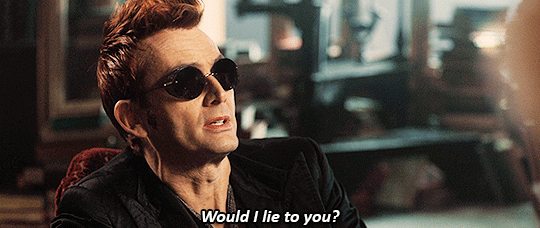
It would not be inaccurate to say that Crowley lies. Alot.
In fact, while I’ve previously talked about how Aziraphale lies through his teeth, TO GOD, TO GABRIEL, and >most heartbreakingly< TO CROWLEY, Crowley is the infinitely more creative and believable liar. He has significantly fewer tells (when not stressed, like you know, after his lover best friend died), watching him seems so much more natural than the twitchy, anxious, Angel we all know and love.
He has some notable lies throughout the mini-series:
Some are minor with big consequences, like in the reports where he takes responsibility for Humanity’s misdeeds.

some are omissions, like when he deliberately He fails to tell the higher-ups in Hell about his knowledge about the Anti-Christ, the location of the Anti-Christ and neglected to correct Hell about it.

Some are a matter of self-preservation, like when he hides his intimate relationship with Aziraphale from Hell
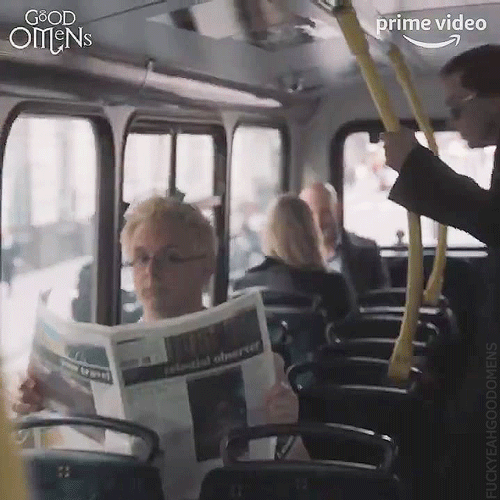
Some are for protection. He says he wants the holy water for “insurance” and when Hastur comes after him (and threatens to go after Aziraphale), his claim comes to fruition. He, however, lies several times in an effort to protect himself and Aziraphale,(and I suppose the world) from Hastur’s wrath. You can see this most notably after Ligur’s death, which makes these lies also kinda a personal “fuck you” to Hastur, (but he’s murderous so he deserves it sorta)
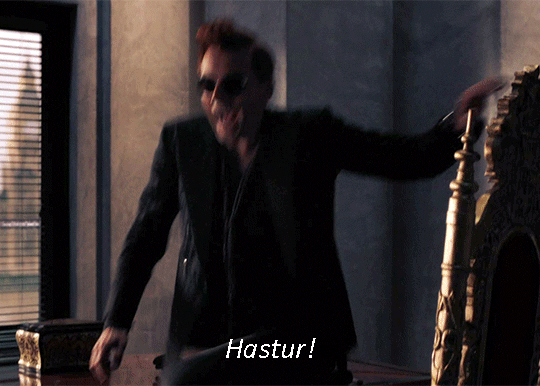
And Finally, some lies are directly in an effort to save Aziraphale. Most obvious of which is when he *spoiler* Impersonates Aziraphale (An F to the U to Heaven kind of lie)

But. NEVER. Once. does. he. lie. to. Aziraphale.
Unlike the demons who he easily deceives at any given moment (particularly in defense of Aziraphale), he refuses to lie to the deceitful.
Are you Satan and have just “blessed” Crowley with the staring role in the Apocalypse? Yeah, great (lies through his teeth about wanting to partake).
Are you a Duke of Hell inquiring about where the Anti-Christ is and trying to confront Crowley about his relationship with Aziraphale? “So Longggg Suckaaas” I’m gonna lie lie lie and possibly kill you for coming towards me and Aziraphale.
Are you heaven trying to torture my best friend >lover< with hellfire that will surely kill him? Not today motherfucker, because guess what? Now I’m him and I’ll lie my ass off to protect him.
Are you an Angel who shows free will and loves humanity as much as he does? 404 Error lies not found.
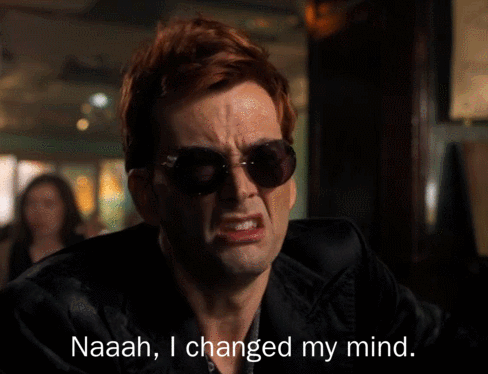
This is not to say he’s always honest about his feeling with Aziraphale. God knows he has really bad communication skills. “NGK”’s and stammering aside, he has an unfortunate self-esteem issue which inhibits his confidence and ability to be fully transparent. This is to say nothing about the 1960′s “go too fast for me” interaction which does little to encourage him. And God, Satan, fuck knows he’s so desperate, to be honest about this, but so scared about being rejected, (and concerned about making Aziraphale uncomfortable, because he’d be rather walk on the consecrated ground than have Aziraphale feel pressured to go a speed he’s uncomfortable with).
Anthony J(anthony) Crowley, OR What’s In A Name?
Which, let’s talk about surprise confrontations, namely when he’s confronted about his name. Names, I think it’s fair to say, are intimate for Crowley. Not only does he have a canonic deadname, (that fuckers like Hastur continuously use despite knowing he doesn’t use that word), but he is very selective about how open he is with it. In many ways, the Nazis “out” his full name, and despite this, he is transparent, answering Aziraphale’s questions about it. This is, remember, after falling out, and (presumably) not seeing each other for almost 80 years. He is uncomfortable clearly, (although part of that is attributed both to the Nazis and the consecrated ground he’s prancing around on) but he’s still directly ready to start communicating about it.
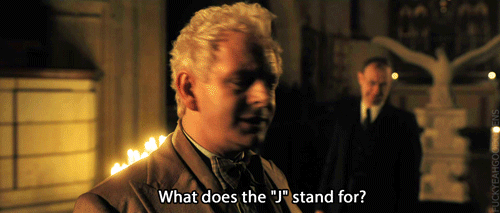
But, despite his apprehension, I don’t think he even lies through omission. When he says the J is “just a J really”, I believe him.
Firstly, because he has no reason to lie about it at this moment and then immediately switch to honestly tell the Nazi’s that he intervened with the bombing, and is sending one directly down on them. Although he’s not believed by the Nazi’s, we (and Aziraphale) know that he’s being honest here and that his priority, above even his own safety, is protecting Aziraphale. There seems to be no reason, to me at least, then for him to code shift here.
Anthony J-“Acts of service” Crowley, is in the middle of yet another demonstration of his love. While he might be hesitant to disclose his motives (see: the few seconds of resistance when at the satanic church-turned-paintball-retreat between telling Aziraphale he replaced the paint guns with real guns and revealing no one is killing each other) but he’s in the middle of rescuing Aziraphale, his comfort is very rarely a consideration he calculates for. Choosing to lie about something so personal, and yet taken out of his control is well within his rights. No one is entitled to out him, or you, without express consent. However, it is out of character for him to do so given how much he trusts Aziraphale and needs his acceptance.
Which brings me to the second reason I believe him. Trust.
In this short exchange, he can tell when Aziraphale hears his secret name, the angel is not accusatory, or dismissive, or betrayed, or really particularly judgemental. Sure he asks “Anthony?” with an intonation denoting confusion at the revelation, and having the information conveyed not through Crowley himself (as he was with “Crowley”), but a third party, and an untrustworthy third party. But even when Crowley presses “don’t like it?”, with a trying-not-to-be-scared-at-rejection air of confidence. Except, he’s not rejected. Aziraphale responds “no, I’ll get used to it”, placing the onus of learning on himself and not on Crowley for unexpectedly choosing a first name. Demonstrating, to Crowley at least, that he can be trusted with more information, without the harsh reaction he’s come to expect from Heaven or Hell.
Look at the above GIF, and focus on the way Aziraphale asks “What does the J Stand for”. His face isn’t angry, (despite being miffed at Crowley not a full minute earlier when he suspected Crowley to be behind Nazism). He’s certainly not focused on “you’ve been hiding a name from me”, or feel entitled to know why he’s just finding out the name. Instead, he’s giving Crowley the opportunity to reveal this information on his own terms. And, effectively, removing power from the Nazis by ignoring them, and by making the conversation about Crowley’s preference. He’s giving Crowley an out here. Asking what it stands for puts the ball in Crowley’s court, not the Nazi’s, not Aziraphale’s, not Heaven or Hells, but Crowley's. He has the power to reveal as he pleases without an expectation or negative reaction. Aziraphale isn’t demanding, he’s asking permission.
Then, Aziraphale subsequently doesn’t bring it up again. Not that night, not 20 years later, not as Nanny, and not at the Apocalypse. He only calls Crowley by his preferred names, and we never see him pressure Crowley to reveal the rationale. The ball is, still, in Crowley’s court.
Whenever Aziraphale asks a question, no matter how light-hearted or serious, he will always give an honest answer, even if it sometimes goes over the angel’s head. >see: Crowley being a blubbering mess because his best friend died and Aziraphale not quite understanding that the best friend is him<
The Final Solution
I think a perfect example of his complicated, but raw, honesty towards Aziraphale specifically, is his request for holy water.
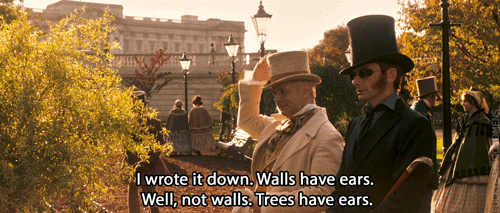
So this is a tense interaction, and arguably really abrupt given both Aziraphale’s surprise and the two friendly interactions we’d seen beforehand. However, never once during this whole request does Crowley lie. Sure, he’s being cryptic, trying to speak in code “because the trees have ears”, but when he says it’s for insurance, not a suicide pill, it is for insurance.
He, more than anyone else, can tell that his relationship with Aziraphale has morphed in such a way over the thousands of years that he knows exposure would put him and, more importantly, put Aziraphale, in danger. We don’t see much of Hell, but we can deduce that if Hell ever found out about it --if it all goes pear-shaped -- they would be subjected to horrific consequences, possibly torture, probably holly water.
Aziraphale, simply, does not believe him that his only motivation is protection because it is too close to his own fears about Crowley being destroyed.
Which is why I think Crowley’s so upset about the word “fraternize”. First, there is a class element involved with the Victorian use of the word (usually referring to someone of a higher class interacting friendly to a lower class member). Where Aziraphale may have meant comradery (and brotherhood, which also not how Crowley views their relationship) Crowley certainly acts as if he took it to mean Aziraphale was speaking to him like an enemy or an “inferior” species.
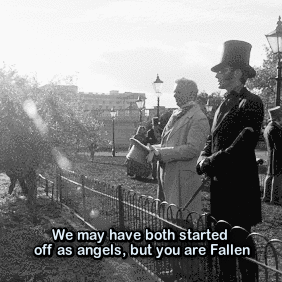
This is only further supported by Aziraphale’s accusatory “we may have both started out as Angels, but YOU are fallen”, placing (in my opinion) too much emphasis on Crowley’s fall (a huge retraumatizing trigger for him). But this whole characterization of their relationship is a lie Aziraphale tells himself to repress his fears about Heaven’s traumatic treatment of him. By this point in their partnership (as we’ve seen) both he and Crowley go out of their ways to treat each other as equals.
To deny it, to repress their feeling is a slap. in. the. face.
Further, the audience for lying clearly matters to Crowley. In the relative privacy of the park, Aziraphale says “fraternize”, which doesn’t do enough justice for the kind of intimacy the uniquely share. It implies they could be enemies or strangers (which they aren’t, they’re at least friends). Crowley is so intimately aware that even now, in the 1800′s, it’s them (and humanity) against divinity. And, Crowley refuses to lie to Aziraphale, especially about the sort of relationship they share. Sure he won’t tell the other demons, and sure as hell won’t tell the angels how deep their relationship goes, but in this private moment, where he’s approaching as a partner (not an adversary)? It would be the worst kind of lie. It would ignore or erase the new space they’ve created for themselves where they can be equals.
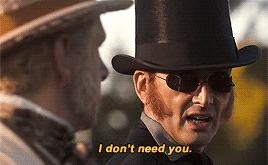
In the above gif, we see Crowley angry and lash out. He says harsh words and insists that he doesn’t need Aziraphale.
Since we’re counting, I don’t think this is a lie. Now, no, it is untrue, he clearly does need Aziraphale in his life, but he’s just been smacked in the face with the insinuation that they are not equals, they are not friends, they are enemies, and I believe him at this moment, a very hurt Crowley, decides if that’s how Aziraphale is going to treat him, then Crowley will treat him like he treats everyone else in his life. He doesn’t need them. He doesn’t need God, even though he talks to her; he doesn’t need Hell or Beelzebub, even though he curtsies to them; he doesn’t need Heaven, even though he will endure them for his Angel. So, clearly, if Aziraphale is going to ask to be treated like everyone else, he will.
At the moment he says I think he means it. Crowley cannot nor, given how everyone else in the series treats him, should not make time for someone who won’t take his concerns seriously. If Aziraphale is going to act as if he thinks so little of their relationship, then he doesn’t need Aziraphale in his life. Essentially, If he can’t be seen as an equal, he’d prefer not to be seen at all.
A Queer Little Lie
Although, this is a temporary truth, and one Crowley is more than willing to correct because he cares about Aziraphale in a way he never does for his hellish counterparts. Crowley cares too deeply to wish Aziraphale any real harm, even if Aziraphale can’t call a spade a spade. Crowley knows that he’s being lied to. He knows that Aziraphale is as afraid of repercussions as he is. He also knows that Aziraphale is not “out” in the same way he is.
Although that’s a post for a different day, you can certainly read Crowley and Aziraphale as being different kinds of queer. Crowley is the outed queer, abandoned, kicked out of his home, and really never given the choice to come out of the closet. Like his name, it was done for him. Aziraphale, in contrast, is the closeted queer who either knows his family will reject him, so he does his best passing, or he has been conditioned his whole life to believe being out in the way Crowley is wrong. He knows that his “family” who is supposed to unconditionally love him, will reject him, and so he has developed the protection of lying. It gives him a sense of safety and control over his situation, letting him (albeit unhealthily) cope. He’s afraid to take that jump over the edge.
So, to protect himself and Crowley, Aziraphale lies.

Knowing this doesn’t mean Aziraphale isn’t hurting Crowley. He is.
But, Crowley understands both the fear and pain that comes with the rejection and is doing his best to provide the support that is being denied. He sure as Hell would move heaven and earth to demonstrate the extent of his love and commitment to Aziraphale in a way that Heaven never does. Where Heaven and Hell lie and gaslight and hurt Azira, Crowley meets him with kindness, even in the face of these lies.
He shows as much in his rescue in 1941, and again when Aziraphale once again lies and says “we’re not friends…I don’t even like you” in the bandstand. These lies actively hurt Crowley but not once does he retaliate with. Instead, he meets Aziraphale with blunt honesty. Saying “yes you do” doing everything he can to get Aziraphale on the same page, and share their truth.

Look at the above gifs. Not only does Crowley KNOW Aziraphale is lying, but Aziraphale knows it too. While he clearly loves Crowley and has loved Crowley for some time, his inability to work through his anxieties and rely on Crowley as a support system, as a partner, he can’t come to terms with his own trauma.
So, Aziraphale lies.
He lies and he hurts Crowley. He lies and he dismisses Crowley’s honesty. He lies and he harms himself because they both know this is a facade he can’t keep up much longer. He lies, because everything else in his life is unstable, and he’s desperately trying to cling to the stability Heaven claims to provide. And, Crowley still meets him with honesty and forgiveness.
And honestly, it breaks his heart (and mine) to belied to so damn much. Under normal circumstances, Crowley could be patient. He could wait for Aziraphale to come to terms with their relationship almost for forever. But, shit hits the fan, and he needs to show Aziraphale that two of them need to stop dancing, stop being cryptic, and cut through the bullshit for once.
Which brings me to the first Gif of this meta. Take a moment, scroll the ridiculous amount up, and just look at the indignation on his face. in the earlier gif “Would I lie to you?”,
He clearly consciously makes a point to never lie to Aziraphale, despite it supposedly being “the demon’s way”. Not in anger (like at the bandstand) not even if it’s uncomfortable (like when he’s criticizing Aziraphale for being so clever and so stupid), not even if the angel is (knowingly or unknowingly) hurting him with his lies.
Crowley draws the line at tainting his relationship with the kind of lies Heaven tells, and the kind of disregard Hell tells. Because despite the lies he’s told by Aziraphale, Crowley knows who he can trust, who he needs on his side, who he wants to spend the end of the world with, and it sure as hell isn’t Hastur or Beelzebub.

Because at the end of the day, Crowley knows what the two of them share together. One great way to see this comparison is to checkout @theladyzephyr ‘s meta on Crowley and his glasses. Because while he does let his guard down for Aziraphale (even if only drunk), his autonomy, his consent to be himself is constantly being taken from him. His name, his glasses, his support system (including Aziraphale), and everything he loves is taken from him.
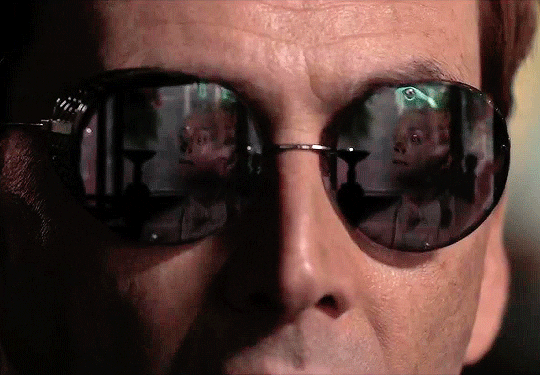
Aziraphale, for all his lies, does not cross the most sacred of personal boundaries as Hell does. He genuinely cares for Crowley even if he’s scared, and when the chips are down he will pick Crowley, pick humanity, and pick their side. He shows remorse for his actions and is clearly just as hurt by his own lies as Crowley is.
More importantly, he comes back. He joins Crowley, and helps support Crowley, and does his best to empower our demon to heal.
TLDR: Crowley refuses to lie to Aziraphale. Many Hearts are broken. Aziraphale does his best. Someone give Crowley a Hug.
Thanks for coming to my TedTalk!
@aardvark-crowley
#good omens#Ineffable Husbands#aziraphale#crowley#crowley's honesty#would I lie to you#anthony janthony crowley#crowely#These two are in love#goomens#good omens meta#ineffable husbands meta#meta#go#a/c#how do I tag things?#FUCK GABRIEL#lying#honesty#hurt#good omens gifs#what am I doing#someone please give him a hug#please give me a hug#in this essay i will#hastur#a. z. fell#aziraphale loves crowley#they're so in love#fight me
275 notes
·
View notes
Text
Homoromantic subtext in ‘The Goldfinch’
The Goldfinch is a novel written by Donna Tartt, published in 2013. It follows the characters Theodore Decker and Boris Pavlikovsky. The relationship between the two is a bit controversial. Literary critics have completely ignored the implications of a romance.
Let’s start with Theo’s toxic masculinity and internalized homophobia. Since the Tumblr user @borispav has already made an excellent analysis regarding the subject, I’m going to quote them.
”…Internalized homophobia is a fear and aversion toward homosexuality that is felt by a member of said sexuality. It’s an inclination toward projection, a way of securing confidence and self-image (two things which are threatened both systematically and socially) by registering one’s own sexual identity as a flaw in other people.
Toxic masculinity (or hegemonic masculinity) is a series of behaviors and traits found in men who have been molded by the ideologies of patriarchy. This mode of thinking presents a set of standards and conventions which men are expected to both adhere to and promote interpersonally.
When it comes to men, the ultimate goal—in both these cases— is to embody the widely advertised image of what is considered to be a ‘normal’ or ‘average’ man. This man is able-bodied and strong (both physically and mentally). This man fulfills the roles expected of his gender. He is ‘masculine’ in that he does not cry nor outwardly express any emotions outside of anger and lust. As a child he is sociable and sporty. He has many friends and does not struggle with fitting in. As a teen he is rowdy and full of life, armed to the teeth with a ‘healthy’ sex drive; the ultimate manifestation of the phrase “boys will be boys”. As an adult he is married and financially stable. He is on his way to achieving the American Dream: a white picket fence, 2.5 kids, and a wife that he feels responsible for protecting. He is straight and always has been.”
”Naturally interwoven amongst the pillars of toxic masculinity sits homophobia and its internalized counterpart. Heterosexuality, after all, is a core part of being a ‘normal’ male. Any other errant attraction is therefore meant to be deftly identified and expunged.
Given the sexual nature several of Theo’s fears toward masculinity take on, I believe it is more than safe to assume that he struggles with accepting and acknowledging his own sexuality (whether it be bisexuality or homosexuality, I don’t have a definite stance) as it is at odds with what has been presented as ‘normal’ male behavior.
Sexuality very nearly serves as an antagonist in this novel. It’s depicted as an emotionally draining entity, a wildness, a physical allure, tangible threat, and elusive dream. Theo is almost always at war with it—a sort of subplot to the story that mainly reveals itself in behavior and attitude, rather than direct dialogue or thought.
Sometimes the terror Theo harbors toward homosexuality (and, at its core, his own sexuality) is visceral enough to manifest itself as a palpable real-life danger. For example, aside from being verbally and emotionally abused by kids at school, Theo is also able to recall an instance where several boys held him down and attempted to sodomize him with a stick of deodorant (615). This memory, like the other, is mentioned in a passing, blasé, way. However, the fact that Theo remembers it at all as an adult—and in enough detail to recall the exact names of his aggressors— speaks to the experience’s traumatic weight.
In a similar vein, we have Theo’s negative re-entry into New York: the two different adult men who were implied child molesters (who cornered Theo and physically chased him down the street) serving as more literal manifestations of his own homophobia (404-409). This is the fear, and false pretense, that gay men are ‘perverts’ or ‘child molesters’ brought to life. It’s Theo’s repressed sexuality taunting and confronting him in a brutal, nightmarish, form; an expected effect of having been taught that a part of his identity is inherently ‘bad’ and unremovable.
This, and the bullying incident, are two prime examples of a fairly common literary technique used in which a character’s strongest fears or desires are made physical, rather than just emotional. Such a device works to symbolize/convey their fervency, demonstrate just how pressing and real they are to the afflicted character.”
A few examples of Theo’s internalized homophobia:
He can’t tell his doormen he’s going to miss them, because he thinks it would sound ”gay”. (238)
He feels uncomfortable in the cab because the driver saw Boris kissing him. (396)
He’s embarrassed to be seen with Popper because the breed is seen as ”feminine ” or “gay”. (402)
He’s distraught when Boris asks if he’s Hobie’s partner. (615)
“As for the internalized homophobia, it’s as ever-present as ever in his adulthood. In fact, I think it actually might even be morepronounced and focused than it was in his youth, when his fears primarily manifested themselves in vague and ambiguous ways. As an adult, his aversion is blunt and easy to identify. He graduates from steering clear of things that might insinuate homosexuality, to steering clear of gay men almost altogether. He’s able to acknowledge that they tend to make him uncomfortable, but in terms of trying to understand or mediate on why this is so, little is done. Instead he deems it suffice to drop in a few cursory sentences here and there whilst on the subject of something else, leaving it at that. No bigger picture is addressed, and no critical issue is implied.
For example, what we get are brief and loaded anecdotes like the following:
“I’d inherited my mother’s light-colored eyes, which short of sunglasses at gallery openings made it pretty much impossible to hide pinned pupils—not that anybody in Hobie’s crowd seemed to notice, except (sometimes) a few of the younger, more with-it gay guys— ‘You’re a bad boy,’ the bodybuilder boyfriend of a client had whispered into my ear at a formal dinner, freaking me out thoroughly. And I dreaded going up to the Accounts department at one of the auction houses because one of the guys there—older, British, an addict himself—was always hitting on me.” (472)
The sheer weariness and disdain with which he views threats to his heterosexuality is palpable here. There’s something almost sinister and deceptive about the way he chooses to portray these scenarios, something nightmarish in the way both men seem to be implicitly taunting him, confronting or incriminating him with the knowledge of a secret he pretends not to know. Both cases are clearly sources of great distress to him, as he feels the need to bring them up in context of something that didn’t exactly need the reference. It’s all fine and good that he mentions the "younger gay guys” noticing his pinned pupils, since the topic of thought was drugs, but then to go off and suddenly engage in the quotation of very specific dialogue (“you’re a bad boy”), and the discussion of very specific fears (being hit on by a guy), suggests that there is some deeper trauma demanding acknowledgment at the root. Theo is bothered by this. He is tormented by this. He uses the word dread (dread!!) to try and convey just how much he does not want to be in the same vicinity as someone who may act upon the assumption that he’s gay. (He wants us to assume that’s only because he’s confidently straight and doesn’t want the attention, but we know, in truth, that it’s because he’s both afraid and enraged at someone knowing and confronting him with such an unbidden part of himself).
Either way, it’s clear that he’s aware of the irrational severity of these fears, otherwise he wouldn’t have brought them up of his own volition or chosen to detail the day-to-day effects of their disproportionally crippling nature (i.e. him now despairing a certain department of his work environment). So yes, at some subconscious level, he knows that this isn’t normal, that he is stunted, emotionally, in some way. However, as I said before, he doesn’t ever think about why this is. He doesn’t try to find the problem, or even allude to there possibly being some small discrepancy in the way he’s always perceived his sexual identity. His aversion toward gay men simply remains a ‘mystery issue’, something of obvious weight that Theo wants us to feel, but not know. (Though, we know what it is anyway.)
And as if all this wasn’t obvious enough, we also get the very particular way in which Boris is framed in reference to Kitsey. He reenters Theo’s life right as Theo’s in a crisis over her, the engagement, and the fact that he’s not in love. And I mean this literally; Theo runs into Boris at St. Marks because he’d been on a walk in efforts to find ease of mind, a refuge from the daunting prospect of upcoming marriage (525). What he does find is Boris. Boris, who then, briefly, assumes the role of a hero— the knight in shining armor who’s come to sweep Theo up and away from the worldly snares of expectation and social-rule. This image is only further enforced when Boris comes billowing into his life again at the engagement party, graciously saving him from what (to Theo) was a downright nightmarish scenario. “Let’s get out of here,” is what Boris implores of him, leading them both to the door excitedly (635). Theo’s immediate response is to recognize that this is what he’s been unknowingly hoping this entire time, that Boris’ plea to run away from the engagement party with him is the “only thing that has made sense” to him all night (635). This is the ever-warring sides of illusion and reality at direct confrontation with each other. Choosing to stay at the party would imply that he has an unwavering loyalty to Kitsey (as in to heterosexuality/convention), while choosing to leave would imply that there are other, more genuine, desires drawing him away to something else at heart (his love for Boris, his lust for that wild edge; life without restraint and rule).
Theo chooses to leave. Or, I should probably say, he has no choice but to leave. When given such an enchanting window of escape, at such a precise moment of emotional distress and internal turmoil, it is impossible to resist. Of course his instinct would be to leave with Boris, even without knowing the details of their destination or circumstance. There’s an innate trust and draw that has been built up inside him from their Vegas years; Boris knows the deepest parts of Theo inside and out, and there are little to no other people in his life that he is tied to like that, little to no people that would provide the same type of relief from social-performance and self-deception as Boris would. On instinct (on instinct) Theo is true to himself for once. He physically runs after the thing he prefers, the thing it is that he actually wants. However, I do emphasize ‘on instinct’ because this is certainly more of a one-time, impulsive, occurrence than it is anything else. In the end it’s still Kitsey who Theo deems worthy of a suicide-note, not Boris. It’s still Kitsey who, despite everything, he continues to remain on the fence about all the way through the end of the novel. So, yes, it’s evident that the instinct (to be honest with himself, to go after what he wants etc.) is there, that—even after all these years—it still remains strong enough to be acknowledged and acted upon. However, the pressures of compulsive heterosexuality and toxic masculinity have not lessened their grip either, and, in the end, they are the ones that win.”
(all of this was from the amazing @borispav ‘s blog, thank you for letting me quote you!)
The story is told in retrospect and therefore is completely dependent on memory. Well memory, as we all know, isn’t very reliable. You forget, remember something incorrectly, manipulate and so forth. It is also sort of implied that Theo’s been using all sorts of substances, from hard drugs to alcohol. On the pages 622-623 we find out that Theo’s a ‘black-out’ drunk (he passes out and forgets things). Boris brings up the painting which baffles Theo since he himself has shown it to Boris but completely forgotten about it. Just the fact that he’s forgotten something so insanely important and significant, makes it more than possible that there are other important things he’s forgotten about. Theo tells us that he’s written the book for his mother, and in the hopes that Pippa would read it one day. This makes him quite biased and sets up an agenda for him, therefore implying that he’s willing to manipulate the story to fit his purposes. And because he’s trying to convince everyone (mostly himself, but also the reader) that he’s in love with Pippa, it wouldn’t make much sense for him to write about the true feelings he has for Boris. Though it’s very clear that he doesn’t actually love her. He even says this on page 570;
”Worse: my love for Pippa was muddied-up below the waterline with my mother, with my mother’s death, with losing my mother and not being able to get her back. All that blind, infantile hunger to save and be saved, to repeat the past and make it different, had somehow attached itself, ravenously, to her. There was an instability in it, a sickness. I was seeing things that weren’t there. I was only one step away from some trailer park loner stalking a girl he’d spotted in the mall. For the truth of it was: Pippa and I saw each other maybe twice a year; we e-mailed and texted, though with no great regularity; when she was in town we loaned each other books and went to the movies; we were friends; nothing more. My hopes for a relationship with her where wholly unreal, whereas my ongoing misery, and frustration, were an all-too-horrible reality. Was groundless, hopeless, unrequited obsession any way to waste the rest of my life?”
Even if you were to interpret it differently (Theo actually being in love with her, or at least being sexually attracted to her) it still doesn’t overrule Theo’s love for Boris (Theo could be bi-, pan-, or polysexual etc.).
Now when talking about Boris’ internalized homophobia, it’s not as severe as Theo’s. He’s a lot more accepting and openminded. On page 314. Boris brings up homosexuality;
”…Old poofter?” he asked. I was taken aback. ”No,” I said swiftly, and then; ”I don’t know.” ”Doesn’t matter,” said Boris, offering me the jar. ”I’ve known some sweet olf poofters.” ”I don’t think he is,” I said uncertainly. Boris shrugged. ”Who cares? if he is good to you? None of us ever find enough kindness in the world, do we?“
It’s very clear that by bringing up homosexuality casually like this, he wants to hear how Theo feels about it. This dialogue also tells us that Boris is a lot more accepting than Theo, who’s shocked and troubled by the idea of Hobie being gay.
Boris doesn’t have trouble expressing his feelings, he often even exaggerates them.
Boris says he’s in love with Kotku even though he doesn’t know her (326)
Boris says that he ”loves” Kotku and that she’s ”the truestthing that has ever happened” to him (328).
Boris says that the 'fight’ he and Kotku had, was ”only out of love”, and that they realized ”how much they loved each other” (360).
Boris tells Theo how he and KT became ”so close” in one night, and how they ”opened up their hearts” for each other (602).
Boris says that Bobo was like a father to him (613).
Boris is telling Theo about his tattoo, and says this; ”…This is for Katya, love of my life. I loved her more than any woman I ever knew.” To which Theo responds with; ”You say that about everybody.” Theo’s comment proves that this is something Boris does all the time.
But with Theo, he can express himself only through action, rather than words. It’s important to bear this in mind whenever interpreting his actions.
Quoting the Tumblr user @queer-deckovskij ;
”…Part II of The Goldfinch Book contains the chapters Badr al-Dine and Wind, Sand and Stars, in which Boris and Theo meet, go on adventures, live a pair of year together, fight, love each other, then say goodbye. These 200 pages are introduced by a quote Donna put right before chapter 5, that comes from the poet Arthur Rimbaud and says,
When we are very strong, - who draws back? very gay*, - who cares for ridicule? When we are very bad, - what would they do with us?
So where do I start? This quote accurately depicts Boris’ and Theo’s friendship in a way that takes my breath away. It contains all the force and stubbornness and courage of the angry youth they represent. She couldn’t have picked a better quote to represent them. But that’s not all. The small poem doesn’t end here - Donna cut the second part of it, which says,
Deck yourself, dance, laugh. I could never throw Love out of the window.
Yes, the poem used to represent Theo and Boris’ relationship is a love poem. I think it’s really important the notion of who Arthur Rimbaud was. He lived in France during the 19th century and while still very young he had a homosexual affair with another poet, named Paul Verlaine; they ran off together and for quite some time they shared a really unhealthy and irregular life, mostly based on drugs and alcohol and dangerous experiences. Les Poètes maudits, yes? They lived in the same house for a few years and ended up splitting up in quite a violent way (Verlaine shot Rimbaud twice). Does this experience remind you of someone? A couple of guys who drank beer and did drugs like it was a packet of chips and a bottle of pepsi? Inserting that quote, Donna Tartt literally compared Theo and Boris to Rimbaud and Verlaine. Which means that, officially, Theo and Boris’s love was not a platonic one.
*I do not know if Donna inserted this translation or a more neutral one, like cheerful or jolly; the original French poem uses the word gai, which literal translates as gay.”
When Boris starts dating Kotku, Theo is forced to think about what his and Boris’ relationship was for the first time. Though, it’s already been implied earlier that Theo might have a crush on Boris.
Subtext of Theo’s attraction toward Boris;
He’s staring at Boris’ stomach (272).
He’s staring at Boris’ neck (284).
He’s staring at Boris who’s wearing nothing but Theo’s underwear (307).
He’s staring at Boris’ shirtless chest (308).
He’s staring at Boris’ lower abdomen (383).
Theo is jealous of Kotku, he’s even depicted as a pissed ‘house-wife’.
Page 327; ”…But what did bother me -a lot- was how Kotku (I’ll continue to call her by the name Boris gave her, since I can’t now remember her real name) had stepped in overnight and virtually assumed ownership of Boris. First he was busy on Friday night. Then it was the whole weekend–not just the night, but the day too. Pretty soon, it was Kotku this and Kotku that, and the next thing I knew, Popper and I were eating dinner and watching movies by ourselves.”
(Theo’s been depicted as a ‘house-wife’ before on page 277.)
Even though he’s feeling jealous and left behind, he still tries to convince himself and the reader that their relationship was nothing but platonic, that he doesn’t really care whether Boris has a girlfriend or not. Still, it isn’t so simple. He can’t find a right word to describe their relationship.
”…But who cared what crappy girl Boris liked? Weren’t we still friends? Best friends? Brothers practically? Then again: there was not exactly a word for Boris and me. Until Kotku came along, I had never thought too much about it.” (333)
If their relationship was really platonic, Boris having a girlfriend wouldn’t affect their “friendship” or “brotherhood” in the slightest.
Theo’s projecting into Boris because of his internalized homophobia. We find out that Theo doesn’t mind Boris showing physical affection, and that he even enjoys it (it’s the only thing that calms him down from his nightly terrors). This is something that he doesn’t want to admit. He’s constantly trying to convince the reader that there aren’t any stronger, possibly romantic, feelings attached. It’s actually quite comedic.
”The funny thing: I’d worried, if anything, that Boris was the one who was a little too affectionate, if affectionate is the right word. The first time he’d turned in bed and draped an arm over my waist, I lay there half-asleep for a moment, not knowing what to do: staring at my old socks on the floor, empty beer bottles, my paperbacked copy of The Red Badge of Courage. At last–embarrassed–I faked a yawn and tried to roll away, but instead he sighed and pulled me closer, with a sleepy, snuggling motion. Shh, Potter, he whispered, into the back of my neck. Is only me. It was weird. Was it weird? It was; and it wasn’t. I’d fallen back to sleep shortly after, lulled by his bitter, beery unwashed smell and his breath easy in my ear. I was aware I couldn’t explain it without making it sound like more than it was. On nights when I woke strangled with fear there he was, catching me when I started up terrified from the bed, pulling me back in the covers beside him, muttering in nonsense Polish, his voice throaty and strange with sleep. We’d drowse off in each other’s arms, listening to music from my iPod (Thelonious Monk, The Velvet Underground, music my mother had liked) and sometimes wake clutching each other like castaways or much younger children.” (335)
In the end, we finally find out that they’ve even been sexually intimate. Since this is something they’ve done regularly, it’s more than safe to say that they’re at least sexually attracted to each other. Still, Theo keeps projecting into Boris, saying that he’s the one ”who might have the wrong idea”.
“…And yet (this was the murky part, this was what bothered me) there had also been other, way more confusing and fucked-up nights, grappling around half-dressed, weak light from the bathroom and everything haloed and unstable without my glasses: hands on each other, rough and fast, kicked-over beers foaming on the carpet–fun and not that big of a deal when it as actually happening, more than worth it for the sharp gasp when my eyes rolled back and I forgot about everything; but when we woke the next morning stomach-down and groaning on opposite sides of the bed it receded into an incoherence of backlit flickers, choppy and poorly lit like some experimental film, theunfamiliar twist of Boris’s features fading from memory already and none of it with any more bearing on our actual lives than a dream. We never spoke of it; it wasn’t quite real; getting ready for school we threw shoes, splashed water at each other, chewed aspirin for our hangovers, laughed and joked around all the way to the bus stop. I knew people would think the wrong thing if they knew, I didn’t want anyone to find out and I knew Boris didn’t either, but all the same he seemed so completely untroubled by it that I was sure it was just a laugh, nothing to take too seriously or get worked up about. And yet, more than once, I had wondered if I should step up my nerve and say something: draw some kind of line, make things clear, just to make absolutely sure he didn’t have the wrong idea. But the moment had never come. Now there was no point in speaking up and being awkward about the whole thing, though I scarcely took comfort in the fact.” (335-336)
Boris feels troubled because his and Theo’s relationship has become so intimate. He’s not sure if Theo feels the same way about him, and that creates a lot of stress and confusion for him. He makes a subconscious decision to resolve the situation by jumping into an impulsive relationship with Kotku (there aren’t any strong feelings attached). The relationship is completely physical, (they’re sexually attracted to each other, that’s it) even though Boris tries to convince Theo it isn’t so. Soon after they start dating, they begin to argue like an old married couple. It even goes so far that Boris punches Kotku (in the face).
Then Theo’s dad dies, and Theo has to leave Vegas in order to avoid his worst nightmare; social workers. Tartt depicts the 'goodbye’ scene quite dramatically, starting it with Boris humming a song by The Velvet Underground called After Hours. The song is about, you guessed it, unwilling goodbyes, love etc. By inserting this song to the very start, Tartt creates the perfect atmosphere for the whole scene, implying that there are strong romantic feelings between the two. They’ve listened to the song together, and so, Boris tries to manipulate Theo into staying by humming it.
”…Boris, I realized, was looking up at the sky and humming to himself, a line from one of my mother’s Velvet Underground songs: but if you close the door… the night could last forever…” (392)
The certainty of the situation starts to sink in on Theo, and he starts expressing his true feelings for the first and last time in the novel, in fact, he’s lost all control over himself. Boris realizes that Theo’s expressing his real feelings (probably predicting a confession) and since Boris has stolen the painting (something Theo’s completely unaware of) he’s accepted that he’s completely ruined any chances of continuing the relationship, (knowing that Theo would hate him after finding out) and just can’t bear to hear any more of what Theo’s saying. So, he interrupts Theo by kissing him on the lips. Now, besides the suggestive placement of the kiss, (not only is it in the goodbye scene but its right before Theo’s confession as well) the way Theo reacts to it makes it very clear that this is unusual behavior, and not something Boris has done before, (Theo wouldn’t have missed a chance to make the whole situation seem as platonic as possible, he would have tried to pull some bullshit like ”oh yeah this is something Boris does all the time lmao doesn’t mean anything”. And they know each other so well that they can communicate without words, so I think it’s safe to say that Theo would’ve known about it if it was usual behavior for Boris.) the kiss is clearly more than platonic, to say the least.
”…Really, you have to come. We can go to Brighton Beach—that’s where all the Russians hang out. Well, I’ve never been there. But the train goes there—it’s the last stop on the line. There’s a big Russian community, restaurants with smoked fish and sturgeon roe. My mother and I always talked about going out there to eat one day, this jeweler she worked with told her all the good places to go, but we never did. It’s supposed to be great. Also, I mean—I have money for school—you can go to my school. No—you totally can. I have a scholarship. Well, I did. But the guy said as long as the money in my fund was used for education—it could be anybody’s education. Not just mine. There’s more than enough for the both of us. Though, I mean, public school, the public schools are good in New York, I know people there, public school’s fine with me.” I was still babbling when Boris said: “Potter.” Before I could answer him he put both hands on my face and kissed me on the mouth. And while I stood blinking—it was over almost before I knew what had happened—he picked up Popper under the forelegs and kissed him too, in midair, smack on the tip of his nose. Then he handed him to me. ”Your car’s over there,” he said, giving him one last ruffle on the head. And—sure enough—when I turned, a town car was creeping up the other side of the street, surveying the addresses. We stood looking at each other—me breathing hard, completely stunned. ”Good luck,” said Boris. ”I won’t forget you.” then he patted Popper on the head. ”Bye, Popchyk. Look after him, will you?” he said to me.” (394-395)
When Theo gets in the cab, he acknowledges his feelings for Boris and confesses his love for him. This is the first and last time he does this (at least according to Theo’s narrative, which as we know, isn’t very reliable).
”Later—in the cab, and afterward—I would replay that moment, and marvel that I’d waved and walked away quite so casually. Why hadn’t I grabbed his arm and begged him one last time to get in the car, come on, fuck it Boris, just like skipping school, we’ll be eating breakfast over cornfields when the sun comes up? I knew him well enough to know that if you asked him the right way, at the right moment, he would do almost anything; and in the very act of turning away I knew he would have run after me and hopped in the car laughing if I’d asked one last time. But I didn’t. And, in truth, it was maybe better that I didn’t—I say that now, though it was something I regretted bitterly for a while. More than anything I was relieved that in my unfamiliar babbling-and-wanting-to-talk state I’d stopped myself from blurting the thing on the edge of my tongue, the thing I’d never said, even though it was something we both knew well enough without me saying it out loud to him in the street—which was, of course, I love you.” (395)
When they run into each other as adults, Theo starts commenting on Boris’ appearance almost immediately. This isn’t something Theo’s done before, his internalized homophobia won’t allow him to. Boris is the only male he depicts this way.
”…There he was, sliding in across from me, slingin the hair from his face in a gesture that brought the past ringing back. “I was just about to leave.” “Sorry.” Same dirty, charming smile. “Had something to do. Didn’t Myriam explain?” “No she didn’t.” “Well. Is not like I work in accounting office. Look,” He said leaning forward, palms on the table, “don’t be mad! Was not expecting to run into you! I came as quick as I could! Ran, practically!” He reached across with cupped hands and slapped me gently on the cheek. “My God! Such a long time it is! Glad to see you! You’re not glad to see me too?” He’d grown up to be good-looking. Even at his gawkiest and most pinched he’d always had a likable shrewdness about him, lively eyes and quick intelligence, but he’d lost that half-starved rawness and everything else had come together the right way.” (596)
Then we find out that Boris has been embittered this whole time because he ruined his and Theo’s relationship (Thinking that Theo holds a grudge for him because of the painting). So, Boris projects onto Theo. He brings up their sexual intimacy, and offends him;
”…why do I feel like you’re trying to change the subject?” ”Not trying to judge! It’s just—we did crazy things back then. Things I think maybe you don’t remember. No, no!” he said quickly, shaking his head, when he saw the look on my face. ”Not that. Although I will say, you are the only boy I have ever been in bed with!” My laugh spluttered out angrily, as if I’d coughed or choked on something. ”With that—” Boris leaned back disdainfully in his chair, pinched his nostrils shut—”pfah. I think it happens at that age sometimes. We were young, and needed girls. I think maybe you thought it was something else. But, no, wait” he said quickly, his expression changing—I’d scraped back my chair to go— ”wait,” he said again, catching my sleeve, “don’t, please, listen to what I’m trying to tell you, you don’t at all remember the night when we were watching Dr. No?” I was getting my coat from the back of my chair…” (622)
Theo is clearly hurt by Boris’ words, even though he doesn’t admit it.
As if all of this wasn’t already obvious enough, Tartt’s sprinkled all sorts of subtext all over the novel;
Theo takes extraordinary notice of the sex books his therapist has. Tartt is already, this early into the book, implying that sexuality might be a theme for Theo. (162)
During Theo’s and Boris’ first conversation, Theo asks Boris to say something in one of the multiple languages Boris speaks and he decides to say something quite suggestive, which is; ”fuck you up the ass”. (265)
Theo’s internalized homophobia is taunting him, he says he feels ”shameful”, ”worthless”, ”tainted” and ”wrong”, and that he doesn’t know the origin for these emotions. (440-441)
Theo thinks about Boris every day and everything reminds him of Boris. (465)
Theo still remembers Boris’ home phone number in Vegas and even uses the last digits of it for the combination padlock that’s securing the painting. (532)
Theo confesses that he has googled Boris in the past. (595)
”You know what I did in college?” I was telling him. ”I took Conversational Russian for a year. Totally because of you. I did really shitty in it, actually. Never got good enough to read it, you know, sit down with Eugene Onegin—you have to read it in Russian, they say, it doesn’t come through in translation. But—I thought of you so much! I used to remember little things you’d say—all sorts of things came back to me—oh, wow, listen, they’re playing 'Comfy in Nautica,’ do you remember that? Panda Bear! I totally forgot that album. Anyway. I wrote a term paper on The Idiot for my Russian Literature class—Russian Literature in translation—I mean, the whole time I was reading it I thought about you, up in my bedroom smoking my dad’s cigarettes. It was so much easier to keep track of the names if I imagined you saying them in my head … actually, it was like I heard the whole book in your voice! Back in Vegas you were reading The Idiot for like six months, remember? In Russian. For a long time it was all you did. Remember how for a long time you couldn’t go downstairs because of Xandra, I had to bring you food, it was like Anne Frank? Anyway, I read it in English, The Idiot, but I wanted to get there too, to that point, you know, where my Russian was good enough. But I never did.” (614-615)
Theo depicts Pippa by referring to Boris. (678)
Tartt has placed a character from one of her earlier novels The secret history, Francis Abernathy, a homosexual man who was forced by circumstance to marry a woman, in Theo’s engagement party as a parallel for him. (710)
”Only what is that thing? Why am I the way I am? Why do I care about all the wrong things, and nothing at all for the right ones? Or, to tip it another way: how can I see so clearly that everything I love or care about is illusion, and yet—for me, anyway—all that’s worth living for lies in that charm? A great sorrow, and one I am only beginning to understand: we don’t get to choose our own hearts. We can’t make ourselves want what’s good for us or what’s good for other people. We don’t get to choose the people we are. Because—isn’t it drilled into us constantly, from childhood on, an unquestioned platitude in the culture—? From Willian Blake to Lady Gaga, from Rousseau to Rumi to Tosca to Mister Rogers, it’s a curiously uniform message, accepted from high to low: when in doubt, what to do? How do we know what’s right for us? Every shrink every career counselor, every Disney princess knows the answer: ”Be yourself.” ”Follow your heart.” Only here’s what I really, really want someone to explain to me. What if one happens to be possessed of a heart that can’t be trusted—? What if the heart, for its own unfathomable reasons, leads one willfully and in a cloud of unspeakable radiance away from health, domesticity, civic responsibility and strong social connections and all the blandly-held common virtues and instead straight toward the bonfire, is it better to turn away? Stop your ears with wax? Ignore all the perverse glory your heart is screaming at you? Set yourself on the course that will lead you dutifully towards the norm, reasonable hours and regular medical check-ups, stable relationships and steady career advancement, the New York Times and brunch on Sunday, all with the promise of being somehow a better person? Or—like Boris—is it better to throw yourself head first and laughing into the holy rage calling your name? It’s not about outward appearances but inward significance. A grandeur in the world, but not of the world, a grandeur that the world doesn’t understand. That first glimpse of pure otherness, in whose presence you bloom out and out and out. A self one does not want. A heart one cannot help.” (852-853). Since the main themes of the novel are authenticity and unauthenticity (good and bad, right and wrong) it makes perfect sense to have sexuality be a subtheme.
Love restricts one’s personal life. Committing to something so uncertain and scary, as serious romantic relationships are, is impossible for Boris due to his traumatic childhood. This (aside from thinking he’s ruined their relatonship) is the reason why he’s stayed out of Theo’s life for all these years.
”…Boris laughed. “And you love her, yes. But not too much.” “Why do you say that?” “Because you are not mad, or wild, or grieving! You are not roaring out to choke her with your own bare hands! Which means your soul is not too mixed up with hers. And that is good. Here is my experience. Stay away from the ones you love too much. Those are the ones who will kill you. What you want to live and be happy in the world is a woman who has her own life and lets you have yours.” (667)
Later, in Amsterdam, during the shootout, Boris physically follows this ideology and his true feelings- he’s ready to die for Theo. Theo confessed his love verbally, this is Boris confessing his love in the way most natural to him, through action;
”…Again Boris moaned, as the guy yanked his hair once more, and from across the car threw me an unmistakable look—which I understood just as plainly as if he’d spoken the words aloud, an urgent and very specific cut of the eyes straight from our shoplifting days: run for it, Potter, go.” (760)
Can a Pulitzer prize-winning author write this blatant subtext accidentally? Is this just another case of cheap queerbaiting? It’s up to you to decide.
———————————————————————————————————–
A look at internalized homophobia and toxic masculinity as presented in the character of Theodore Decker; https://borispav.tumblr.com/post/179768610308/a-look-at-internalized-homophobia-and-toxic
by https://borispav.tumblr.com/
Post on Arthur Rimbaud’s poem; http://queer-deckovskij.tumblr.com/post/171833208225/so-very-important-detail-i-dont-know-if-any-of
by http://queer-deckovskij.tumblr.com/
All page numbers are from my copy of the book, meaning that I’ve changed the ones in the quotations from the original ones to my own.
I received technical writing help from a friend of mine, as I am dyslexic and have trouble expressing myself sometimes, who wants to stay anonymous, thank you anonymous!
2K notes
·
View notes
Note
hey so if you wanna hit me with that sweet sweet elijah’s characterization meta anytime please feel free. or direct me to any previous posts because my dumb ass is using this time to re-obsess over vampire melodrama.....
It appears that most of my non-tag and non-petty-casual commentary is still in drafts... so instead of finishing the ‘What the hell is wrong with season 4: an itemized list’ meta and finishing answering the ‘What would you change if you could rewrite any of the show?’ ask from a while ago, I’ll just pick out the Elijah bits and add on to them for garnish. (Those posts might exist at some point. But honestly not soon enough for me to worry about people getting annoyed with copy/paste so PREVIEW TIME: ELIJAH FLAVOR)
This is way sloppier and un-cited than I usually meta, by the way, but what the hell, The Fandom is Dead and I Only Have Friends to Entertain Now, so if anyone gets angry and tries to step into my asks then it’ll just be nostalgic rather than annoying. Here’s the starter, which is from the F*CK YOU SEASON 4 meta and quite a few of these points will be repeated later because you asked for it technically so.
The cracks in the narrative began to show as early as season two, and believe me when I say I’m not saying this because I love him - it began with Elijah. I can make a lot of arguments to this effect, but the only one that I am certain is not propelled by my very strong bias concerns the presentation of the Red Door.
Initially, I was ecstatic at the opportunity to explore Elijah’s past, his perspective, his darkest moments. I was a bit wary in that it seemed as though the narrative wanted to Explain Everything about Elijah through this device, but he was finally getting some attention so I tried to hold back judgement.The result was pretty promising. One of the most gorgeous moments on the show occurs when Klaus enters Elijah’s mind and tells him how much he needs him. It showcases the main pillar of the show - the structural trifecta of Hope, Klaus, and Elijah. And afterwards, as usual, Elijah pushes the experience away.Until it’s convenient.
Elijah begins to be erratically vicious. At first, I felt as though it wasn’t handled poorly, I could explain away my worries easily, and that was all I needed. But it happens over, and over, and over again, with the same excuse - protecting the family, protecting Hope. Elijah’s triggers, once so crucial, begin to break down, but we don’t see why or how that process occurs. He begins to be the character that is level-headed when it is convenient, and a violent one-track-mind when it’s convenient. Eventually, in order to maintain balanced tension with a softening Klaus, Elijah became violent without nuance in every situation. His continued development is no longer possible, since his character no longer displays depth.
Which is annoying, as a fan. But as a person who loves to analyze narrative, it’s a huge red flag. Elijah is necessary for this story. His love for Klaus, and Klaus’ relationship with him, is one of the things that holds the narrative together as it goes forward. The two of them need each other in order to experience growth, but cannot grow from each other any longer - and that friction is what provides energy and substance that can help drive a multi-year melodrama. This is why I mentioned above that Elijah’s violence was likely intended to balance with Klaus’ changing heart - but there is no balance in the level of development the two brothers experience. It has been shoddy in many places, but attention has been given to Klaus’ journey towards peace and kindness, while Elijah has been given a single metaphor, a single psychosis, and is expected to carry half of the narrative weight. The story has no choice but to make a plot device out of him - he simply does not have the required depth to be anything else, which is made obvious by the attempt to do so in the ritual to bring Inadu to the material plane, which I will discuss later.
When his development is ignored, when he is used as a tool to get from point A to point B time and time again - that’s when the pillar starts to crumble.
Zooming back in on s1, this was actually my only major structural gripe with season 1, so it comprises the entirety of the ‘what would you change’ for that season:
The poison that rotted the whole dang show started very small — casting Elijah too strongly as a white hat, to offset the darkness of the rest of the main family. This was the right move, of course, but it was pushed a twinge too far and it was the tiny weight that set everything wobbling. As an offshoot of that, this was also done with Hayley to a degree. I would have had them bond very similarly to the way they do in the show, but I would have had them connect at least once over the skeletons in their closets. (Only once or twice, again, since their ship relied in this season on the fallacy of each other being saviors). In fact, this was one I felt so strongly about that I actually did rewrite their scene in 1x07 ‘Bloodletting’.
Then season two when it gets more pronounced:
The rift in the show widened with the swing-and-miss that was The Red Door arc. Elijah became a Problem when it was convenient for the plot and A Fixer/Sounding Board when it was not. They used probably the most INTERESTING and INTEGRAL part of his characterization -- which had been a mystery for YEARS counting The Vampire Diaries appearances -- and Elijah discovering that either from trauma or his mother’s magic, he has repressed the moments which forged him. This lack of knowledge, this lack of control, should have been something much more cataclysmic and its effects should be clear when comparing ‘Elijah Before’ to ‘Elijah After’. Instead, it kind of served to take off Elijah’s ‘White Hat’ that he’d been illy-fitted with in S1, and allow him to accessorize with it or whatever version of Elijah fits the episode at hand.
This tension, and this chaos should have been much stronger and much more messy than simply putting the Suit back on and being Pretty Much Okay (barring one plot-insignificant diner massacre) only a few episodes later. It would make the therapy scene later with Camille even more gorgeous than it already is and it would then place Elijah’s moment of catharsis, and the beginning of his attempts to move on, with Klaus’ monumental forgiveness in 2x11. I think this is what was intended, but it was not at all achieved, because Elijah is such a tricky character to write, and it is so very easy to use him for whatever the scene requires. Because of this, Elijah’s struggles got dropped just long enough for Klaus’ forgiveness to hit powerfully in viewers for Klaus, but not for Elijah. The writing began to lean on Elijah as a Drama Everyman more and more throughout the show, and it’s just tragic to me that The Red Door wasn’t utilized to its potential. (And that we didn’t have a Klaus/Tatia conversation, but hey, I have an unfinished fixit for that whole saga on Ao3, you’re welcome and I’m sorry).
In season three, we got a few good glimpses of the kind of complexity that Elijah should live in -- the way he kills Arianne, for example, I’ve linked what I called a ‘headcanon’ but in retrospect it was pretty explicitly canon -- and we see the youth and terror and involuntary power in him in the flashback where he discovers that Klaus killed their mother. But the relationship between Tristan and Elijah? The man that he made, and that made him? That was far too pedestrian to have produced either of them. If Elijah learned ‘nobility’ from Tristan, learned what ‘superiority’ looked like, and this was the time that he began to change... we should have had words between them, or a scene highlighting just them, at least once in the flashbacks.
If this season was supposed to be about the creation of the Trinity, the First Children (because Finn didn’t tell no one that Sage is actually the oldest ‘cuz he’s an ashamed little bitch) why did we see only TWO of the THREE transformations? Klaus turned Lucien accidentally, trying to heal him. Rebekah’s sympathy and love were used as Aurora’s tool to turn herself. When and how did Elijah turn Tristan? It is explained that Elijah turned him in order to create a third vampire for his plot to trick Mikael into chasing them instead -- it is explained that Tristan, Aurora, and Lucien were compelled to believe that they were in fact Elijah, Rebekah, and Klaus in order to make their decoy impeccable. But when this compulsion was shattered -- when Lucien learned that he had been used and made monstrous as a tool for a monster who wasn’t even noble -- did he confront Elijah? Did they ever speak, or was their next meeting the day Elijah learned that Tristan had taken over Elijah’s coven? I would argue that Elijah needed equal weight in the France flashbacks even though he didn’t have a flashy romance (though if early press release rumors were true, he and Tristan could have had one and that would have been perfect)
Season four is really where you can pick an episode and Elijah will put on the stage makeup and play any part. It’s also -- BIG COINCIDENCE -- where the plot deteriorates completely. Here’s just one example from my Excuse You What the Hell? Season Four meta:
On to the next moment that showed major neglect (I know this has been Elijah-heavy so far, but again, this is where the problem started so I want to carry this thread through for a while before addressing other issues) - the ritual to bring Inadu to the mortal realm. The purpose of this ritual was to scare viewers with the risk of Hope’s safety and hype the Hollow’s “bad”ness, but also to make the first move in the ‘Letting Go’ thread between Hayley and Elijah. Elijah was supposed to be forced to choose between children's lives and letting the Hollow loose upon the world, and decide to kill the children. That was the dramatic point of placing this ritual in the narrative, but it isn’t mechanically sound.
It is stated outright that the ritual has to end with the death of the children linked to the spell. The children were linked via their totems found in 4x03 - placing Hope definitively in this group.
But we only ever see four of the five in one place. Maybe it was worth it to the Hollow to reach as far out as Hope was to bind her via her hairbrush, maybe it was worth it to the Hollow to drain her from afar, I’d buy that easily. But they made no attempt to kidnap her and place her with the other four children during the ritual. The ritual that required the deaths of five children. Unless it required Hope to be there only on standby, which is absolutely ridiculous. They had the kids on an alter, even if it was just for show. But why not all of them? If the real goal of the ritual was to lure Klaus and/or Marcel, wouldn’t kidnapping Klaus’ child be a more surefire way to accomplish that rather than just hoping the Mikaelsons would come to the right mystical diagnosis in time?
The reason why Hope wasn’t there was because the ritual was never thought through. The reason she wasn’t there is because it didn’t make sense for Elijah to want to kill Hope to stop the Hollow, which is what this ritual actually demanded if it actually worked the way Vincent claimed. In actuality, all that was desired was for Elijah to display a willingness to kill innocents in front of Hayley, and in doing so it demanded that Hope’s life both be at stake and not at stake at all. This failure to coherently execute a single-episode arc is plainly poor storytelling. It displays not only disrespect to the narrative structure, but a blatant flippancy towards one of their main characters and arguably the most complex one on the series. The sloppily contrived tension here between Hayley and Elijah does eventually contribute to the supposed theme, yes, but at what cost?
Elijah was neglected because he was hard to write, and even harder to write well as a ‘light’ foil to Klaus. Marcel should have fully owned that role, and not been similarly jerked around as a plot-serving every-man once the mystery of season 1 and the reasons behind Marcel’s ‘senseless’ cruelty were revealed.
Elijah was always the cornerstone of the family’s narrative, because he was complex enough to carry it. Camille provided an additional column of support to Klaus’ individual journey as a person/father, but she was bulldozed for Allmighty Plot as well. By the end of season three, both she and Elijah had effectively been thrown in the garbage one way or another, and the show tried to go on without them. It couldn’t.
I will say that Elijah’s conversation with Hope in that ludicrous backdoor pilot did make me feel things. I did also see the clip where Elijah and Klaus have a heart-to-heart in some sort of european flashback, which was touching, but felt incongruous for their relationship/dev at the time. Hope asking Elijah how old he was when he made his promises to Klaus, though? Elijah offering carte blanche to Hope for how to punish her friend’s bullies? TWO OF THE THREE SCENES INVOLVING ICE CREAM?
SOME of season 5 is valid but ONLY because it stole scripts from my headcanons.
#anamysis#preview of some metas in progress#hey guys does anyone here want to talk about ELIJAH?#*pepe silvia voice*#Anonymous#asks
12 notes
·
View notes
Text
“I saw your future” - Misunderstanding and projection in The Last Jedi
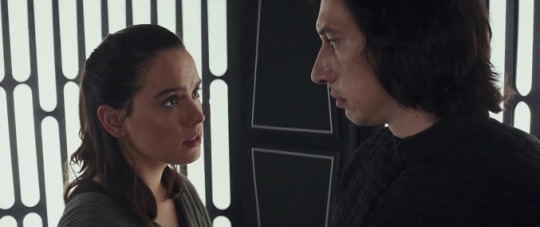
I want to write about something I’ve been thinking about for a while now: the way this movie is ultimately about misunderstanding between characters in general, and specifically about the mutual projection between Rey and Kylo Ren.
To give a brief summary:
Star Wars: The Last Jedi repeats the theme of misunderstandings several times. We have Poe and Holdo whose clash is caused by both failing to communicate properly and misjudging each other's character - Poe doesn't trust Holdo's leadership and Holdo sees Poe as nothing more than hot headed pilot. Finn and Rose, too, have a rocky start stemming from Rose's misunderstanding of Finn's actions - only gradually she comes to realize he isn't the coward she took him for. There's also DJ, who the heroes assume to be a decent guy, only for this to backfire when he betrays them. And of course Snoke meets his end when he fails to understand the changes in his apprentice.
That the theme is central is very obvious, but it’s what goes on between Rey and Kylo that is really interesting, because not only is that where the theme gets examined more deeply, I also believe this is where many differences between how viewers have interpreted the story come from. You see, in this aspect TLJ is a tricky movie - it fools the viewer into choosing one flawed perspective and buying into it.
What does an abandoned little girl see in a boy whose master turned against him? What does a man terrified of his own weakness see in a scavenger possessing great power? Only what they want to see.
I’m putting the rest under a cut because this got a bit long. For the record, I'm fairly critical of TLJ as a movie, but I believe this particular aspect of it has been misunderstood and ignored. English is not my first language so I apologize for any mistakes.
After The Force Awakens, Rey sees Kylo Ren as nothing more than a monster. When he shows up, she lashes at him, calling him just that. But when Kylo shows her his perspective - how he was betrayed by his master Luke - Rey's opinion changes. She attacks Luke. And although we see Luke's version of thing's which is different, Rey has begun to believe now that Kylo can be redeemed and she takes a great risk to go meet him.
Why? Because in TLJ, the dynamic between Rey and Kylo Ren is not just about misunderstanding - it's also about mutual projection.
Rey is an orphan, who has waited patiently for years for her family to return, refusing to give up, continuing to hope and trust that they care for her and will come for her. This abandonment that she has not yet faced, defines her. Finding her parent's is her greatest wish, accepting that they left her is her greatest fear. So it's not surprising that when she sees that vision of young Ben Solo, betrayed by the uncle her trusted, that she is very emotionally affected by this. It connects straight to her own trauma of abandonment. She attacks Luke which such fury, it is almost like subconsciously it's not him that she is angry at, but rather, it is the repressed anger towards her parents that comes out. Rey easily believes Kylo's version of the story - that he is the victim, Luke and his parent's let him down - because all those things are true FOR HER. Rey is the victim, left alone in a merciless planet to fend for herself. Her parent's did betray her trust. And so, she starts to project her own experiences onto Kylo, believing that they are not so different deep inside. And if they are not so different, then Kylo, too, must be desperate to find a family, a place to belong to. If Rey just gives it to him - offering friendship, forgiveness, telling him he can still come back, he still has a family - then Kylo will surely accept and return to the Light.
But meanwhile, Kylo too has come to believe there is a special connection between the two of them, and that deep inside he and Rey are not so different. And just like Rey's, his assumptions of who she is and what she desires are a projection. Kylo Ren is obsessed with power. His own weakness, vulnerability, is his greatest fear, and his greatest desire is to eliminate this weakness, to metaphorically murder Ben Solo and the past that keeps him from fully embracing the Dark Side. Kylo does not seek to return to his past, his family, but to move away. What Kylo knows of Rey is essentially that she is seemingly a nobody, a lowly scavenger, abandoned by her family, yet exceptionally gifted in the force. It is inevitable, given his own issues, that Kylo then assumes that naturally Rey must hate her family and must wish to kill her attachment to them that is hurting her and holding her back. Another defining trait of Kylo Ren is his obsession with legacy and status, the way he idolizes Darth Vader and seeks to emulate him, the way his own bloodline and it's specialness has defined him. So it is also inevitable then, that he would assume that the Rey must be equally fixated in these things and therefore, the idea of her parents being "nobodies" would disturb her. If only Kylo gives Rey a way out - encourages her to kill her past, to accept the reality about her parents, if he gives her the opportunity to escape, to become special like him, something more than a daughter to be sold for drinking money, that Rey would of course accept, turn to the Dark Side and rule the galaxy together side by side with Kylo.
There is a very fascinating little that sums up this dynamic, their mutual fantasies of each other's that are so far from reality. I'm talking about the scene in the elevator just after Kylo catches Rey. Here is their dialogue:
REY: You don't have to do this. I feel the conflict in you. It's tearing you apart. Ben, when we touched hands, I saw your future. Just the shape of it but solid and clear. You will not bow before Snoke. You'll turn. I'll help you. I saw it.
KYLO REN: I saw something too. Because of what I saw I know when the moment comes you'll be the one to turn. You'll stand with me. Right?
This is interesting scene. We know force users are sometimes capable of seeing (or at least sensing) the future. But nothing we've seen has indicated that this would be truly the case here. Rather, it seems that both of them are making assumptions of whatever they sensed - or believe they sensed, for this an important distinction here. But we see in this moment, that both are convinced they are right.
Then, they step in front of Snoke, and although it seems for a moment that Kylo has lied to Rey, lured her into a trap, he turns his lightsaber against his master instead. They then fight the guards side by side. For a moment, it seems like they are on the same side. But this is an illusion. And in the next moment, the illusion comes crashing down.
Rey tells Kylo to order the First Order to stop attacking the Resistance. But instead, Kylo tells him: "It's time to let old things die. Snoke, Skywalker, the Sith, the Jedi, the Rebels, let it all die." And now Rey starts to understand. That Kylo Ren is not the man she believed he was. Kylo wants her to rule the galaxy with him. It was never about family, finding a place to belong - to her yes, but not to him. Kylo Ren did not kill Snoke to destroy the Supreme Leader, but to become the Supreme Leader. In true Sith manner, the apprentice kills the master and takes their place. Kylo no longer needs Snoke, and ironically, it seems that his connection with Rey and the illusions it was build on, helped him become more confident in his convictions. Look at Kylo's reaction when Rey rejects her.
It is not merely disappointment or hate. It is first confusion, then angry frustration. He offers his hand expecting Rey to take it. "No, no, you're still holding on, let go!" The he tries to use the truth (?) about Rey's parent's to turn her. I think it's important to note here that Rey doesn't speak much - it is Kylo who talks about her parents, and there is no reason to believe he has any real info about them. He merely states Rey's worst fears to manipulate her - or at least, what he believes her worst fears are. He believes that it will hurt Rey to know her parents are "nothing" and she "has no place in this story" - and that then offering her a chance to become something ("But not to me") will make her change her mind. Rey cries, but I don't think there is any reason to believe that she cares about her parents being "filthy junk traders". We're never given any hint that Rey wants to be "special" - that is Kylo's obsession, him projecting his own issues with his legacy onto her. She simply cries because she knows her family is probably dead and may never have cared about her to begin with. And because she has already found a place to belong to and people to care about, she rejects Kylo. The last shot of them together has Rey closing the door of the Falcon - and cutting the connection between them.
Kylo Ren never sought Rey out for his salvation, and Rey never sought him for power and chance to run away from her past. And yet, many people who watched the movie, seem to have been mislead the same way as the characters were. Especially Kylo's character arc is often seen as path towards light, when it seems to me clear that this was merely what Rey and the viewer are first lead to believe. I see no real evidence that TLJ takes Kylo closer to redemption - quite the opposite, he clearly takes an important step towards growth as a villain (not that he couldn’t been redeemed later - it just doesn’t happen here). In the last minutes, when he assumes the title of the Supreme Leader, orders the Millennium Falcon (with Rey inside) to be shot down and confronts Luke, we see Kylo Ren as more confident than ever before. Here, he finally seems like a true Sith, not a boy playing dress up.
Similarly, some viewers seem to take Kylo's interpretation of Rey as truth. I've seen many people arguing that the talk about "nobodies" and having a place in the story seem to go against Rey's character, but like I explained, this is Kylo speaking.
It is also Kylo speaking when he talks about letting the past die, a line that some have taken to be some kind of core message of the movie. That supposedly, Rian Johnson wanted to send the message that the past - the previous movies, the nostalgia - should die. But again, this is a line by the villain and the movie makes it pretty clear in the end that Kylo is wrong. Because killing the past didn't work. Like Snoke says, murdering Han Solo made Kylo weaker. As Obi-Wan once said to Vader: "Strike me down and I will become more powerful than you can ever imagine." The memory of Han and the guilt will haunt Kylo forever.
This is also important for Luke's characterization, because it is here that we see Luke overcome his own guilt and sense of responsibility towards Kylo. When Kylo kills Snoke and still rejects Rey's offer, he does it all out of his own choice. There is nobody manipulating him now. Until that moment, he has been able to blame Luke, blame his parents, blame Snoke. Now, he is the one in charge of First Order, nobody is ordering him around, Rey has offered to help him, Leia still loves him, he could return at any time - and he doesn't. Luke was a loving uncle and a good master to Ben Solo for the boy's entire life. Yes, he failed Ben, one time, for a split second. But Luke didn't make Ben slaughter his students and run away and join the Dark Side. He - and Han and Leia - are not the one's to blame. Ben Solo made his own choices, and he is the only one who can save himself. This is not Luke Skywalker as some horrible monster or pathetic failure, this is a man who lived a long life dedicated to the good and made one mistake, then ended up punishing himself for it for years. Far from iconoclastic anti-nostalgia lesson, the true message of this movie is one of accepting and confronting the past (Rey and her parent's, Luke and Kylo).
I think these are all my thoughts about the subject - this ended up being longer than I wished... But yes, this is what TLJ, in all of it's flaws and other issues, is ultimately about to me. This is what I personally believe Rian Johnson set out to achieve with his movie.
16 notes
·
View notes
Text
I Don’t Understand You
So this chapter ends with the starts of two more fights. As I said to begin with, considering the clowns are only playing a game to buy time they’re at an inherent advantage because they’re more self aware than the flimsy CCG vs Ghoul alliance who are all repressing their issues in order to work together, and really have no figured out any solid motivation besides “stop the bad guys.”
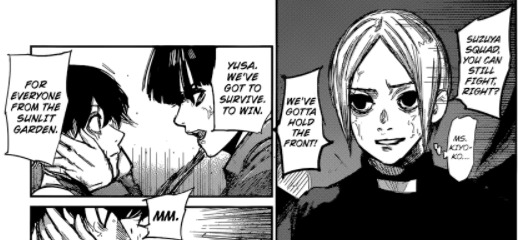
For a quick example the confrontation with Kaiko brought up a lot of relevant questions. Is it fair that half humans have to live half lifespans with no chance of extending it, or should something risky like ghoulifying Yusa be done to help extend his own lifespan? How exactly is the harsh way Kaiko trained Arima any different from the way Arima trained the likes of Kaneki, Take and Yusa? What exactly did Arima sacrifice himself for if he could have extended his life a few months later, and what is his legacy now? Is Yusa only defined by Arima’s legacy?
And Yusa received the answer to a whole none of those questions. He’s just urged to keep fighting and keep surviving, because that is literally all the main characters are capable of envisioning at this point.
So, that being said there’s no way the two current fights can turn out in anything better than a draw, because the two characters choosing to confront the clowns are those that understand them the least.
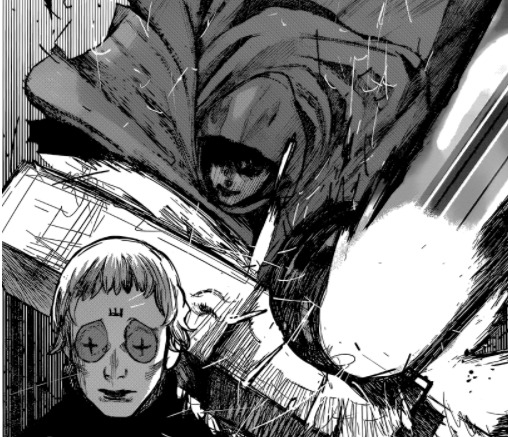
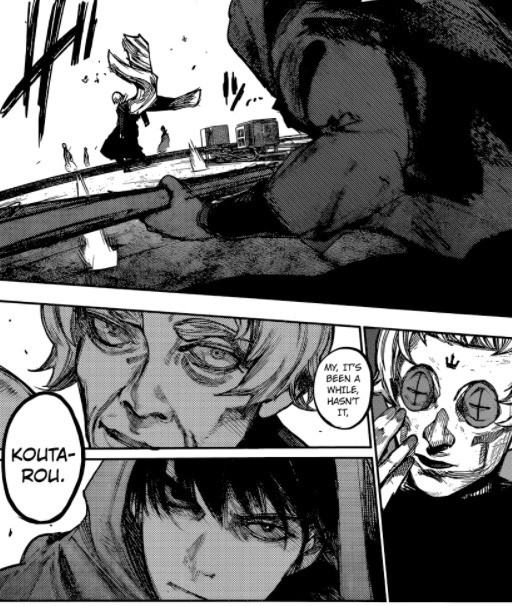
Despite the fact that Amon was ghoulified literally so he could understand that 1) not all ghouls are Donato and 2) that a ghoul as wretched who ate as much as Donato could eat human meat but somehow love him at the same time because ghouls have human minds and emotions, Amon has not mentioned Donato once or even the comparison to Donato for 168 chapters of :Re.
If you look back to the rooftop conversation with Amon and Donato, while neither of them changed their views, the conversation did a good job of illuminating the fact that both of them held self-righteous and flimsy beliefs. Kaneki said he didn’t care about the vast majority of people and only did this for his friends, and Amon said he did not care about ghouls and does not think the beliefs he held at the time of being an investigator was wrong.
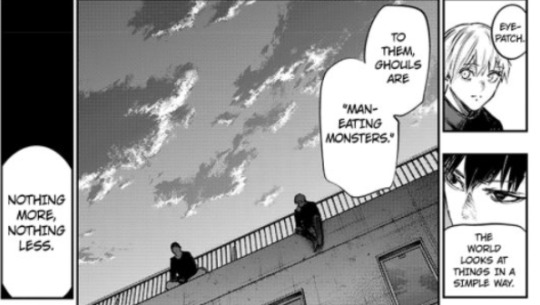

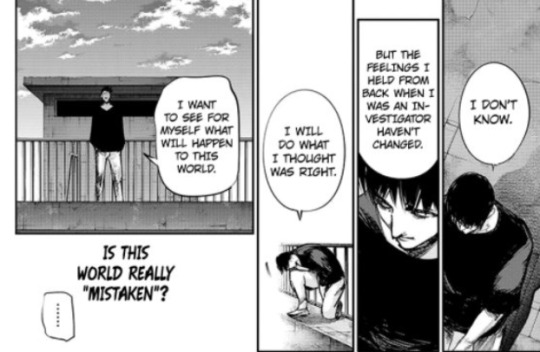
The point is that Kaneki was called out by the plot for holding such a false and self righteous belief. He was picked apart line by line in order to point out that yes, he actually does have to care about things besides the people who are directly around him because his actions have greater reaching consequences than that.
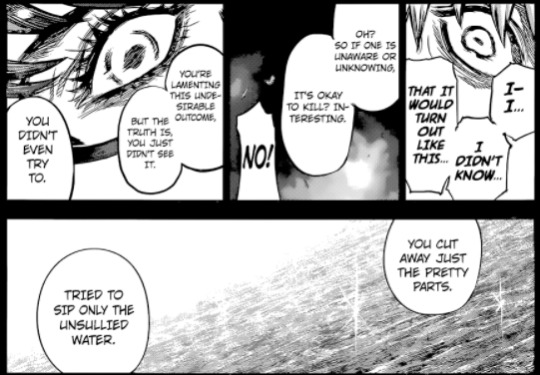
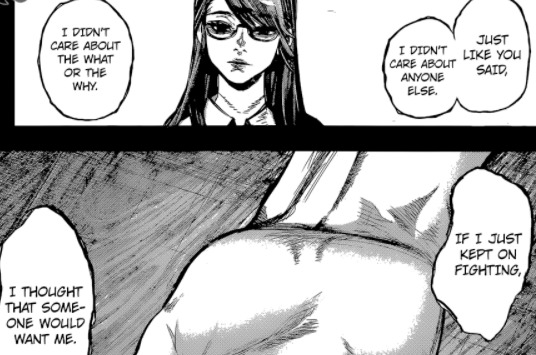
In Kaneki’s case the beliefs he held on his rooftop conversation with Amon turned out to be a bad thing. So it should stand to reason that Amon should face a similar consequence for his willful ignorance.
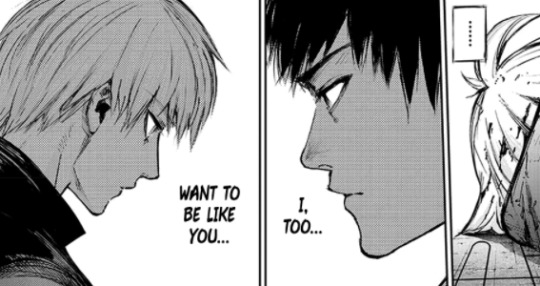
Amon and Kaneki are continually put on pedestals and held up as heroes, when in reality both of them are just traumatized children trying to survive. The problem is in their coping they’ve killed a lot of people, Amon killed many in his time as a human, and then once he became a ghoul he turned into some kind of cannibal according to Urie’s observation.
Both of them see ghoul life as expendable, and for Amon the root issue with this cause has always been Donato, which will be the perfect instance to challenge his hypocrisy on this part.
Amon has to lose to Donato, I don’t think there’s a single Amon fan who actally wants him to win. Donato represents the ghoul part of Amon, and his demonization of ghouls which he has not at all come to terms with. Amon in this chapter even acts the same as ever.
He comes dramatically blazing in swinging his quinque (he’s still using a quinque even though he’s a half ghoul). He even attacks almost the same way he did on his reintroduction in Rueshima, with the exception of this time Donato sees him coming ahead of time and blocks him easily.
Amon’s hero act should fail him at this point.
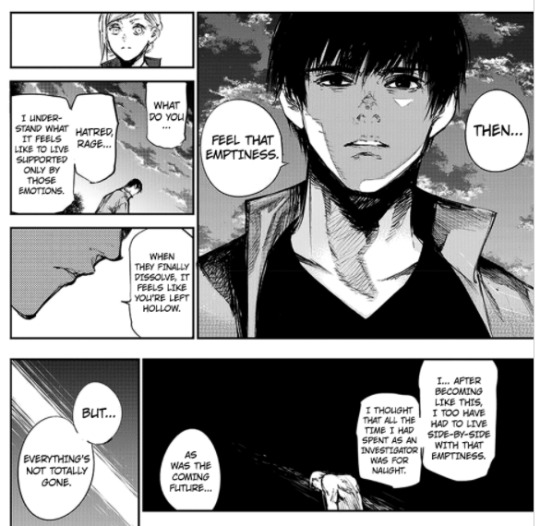
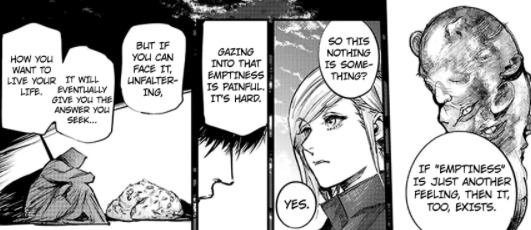
Pretty much everything Amon has said in the build up to this fight is that he doesn’t actually want to understand ghouls. He doesn’t want to understand his existence of a ghoul. All he wants is to return to the time where he could easily fight at the CCG without questioning himself.
Him and Akira are both offered illusory returns to the CCG when they were finally beginning to break away and form their own identities, the same way Kaneki was offered an illusory return to his home of Anteiku. Except Kaneki’s illusion was only enertained for so long, it burned apart right in front of his eyes and logically the same should follow for the two of them.
There’s two things that Donato could say that could easily tear apart Amon’s resolve right here.
1) The Person Amon is fighting for right now, Kaneki the symbol of their alliance is somebody who ate children just as Donato did. Not only that the first child he ate was Hajime Hazuki, the child Amon was inspired to save all those years ago.
2) The person Amon holds so close to his heart, Mado Kureo is really just a parallel of Donato that the CCG told Amon it was acceptable for him to like. Kureo was a sadist, who among other things targeted and enjoyed the pain of a child and Amon stood by his side and watched, feeling himself justified because the child he was targeting was a ghoul child rather than an innocent human.
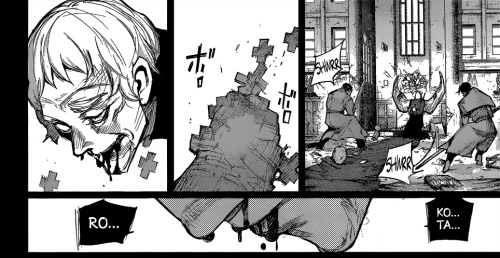
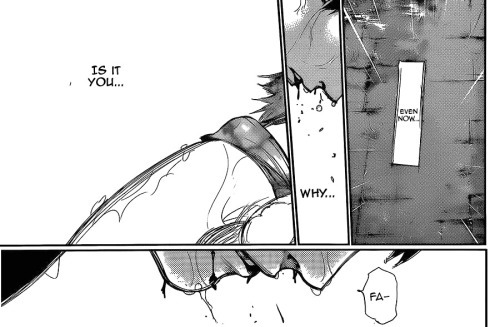
Most importantly that Donato and Amon do love each other. As this is fundamentally unresolved about Amon there’s really no way he’s going to come to grips with it in the middle of a fight.
Finally, Renji and Yomo. This is going to be short but basically, Yomo’s words right here are the epitome of everything wrong with the Goat/Human alliance right now.
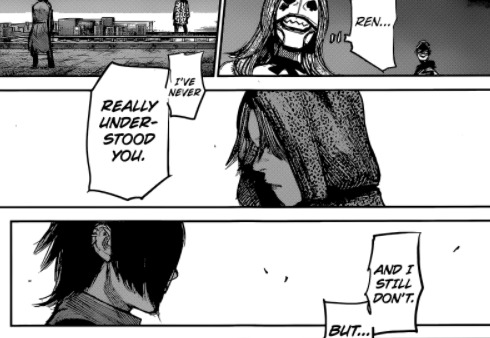
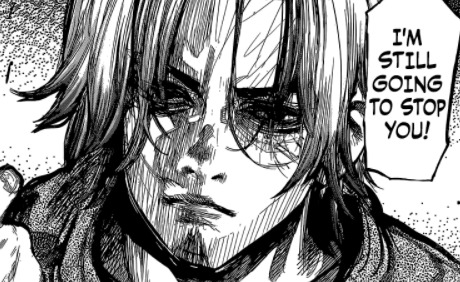
“I’ve never really understood you, and I still don’t, but I’m still going to stop you.”
How exactly Renji, are you going to beat an enemy you don’t understand? That is the question, and Renji has delayed this confrontation with Uta as long as Donato has himself with Amon.
The thing is Yomo has known about Uta’s relation with the clowns since the beginning. He just deliberately chose never to confront him about it. Renji doesn’t understand Uta, because Renji himself never really tried to understand Uta.
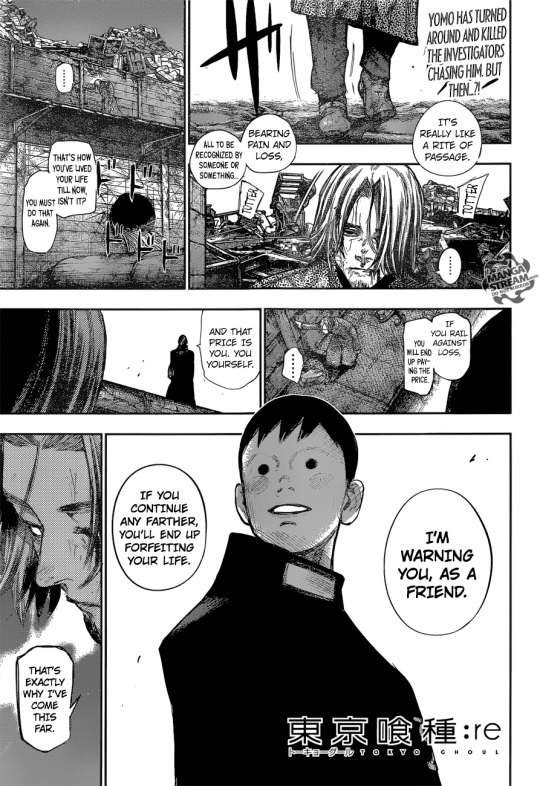
Uta even tells him to his face, that really the only thing he defines his life by is his own loss. As long as he continues to do that, he’ll only lose others or himself, and Yomo doesn’t come up with a satisfactory answer besides.
“Watch me Uta, I’m going to sacrifice my life for Touka even harder now.”
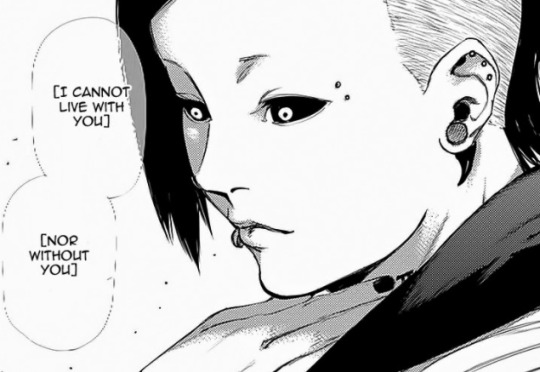
Yomo and Uta are really the embodiment of the tattoo around Uta’s neck. It’s even embodied in their old rivalry.
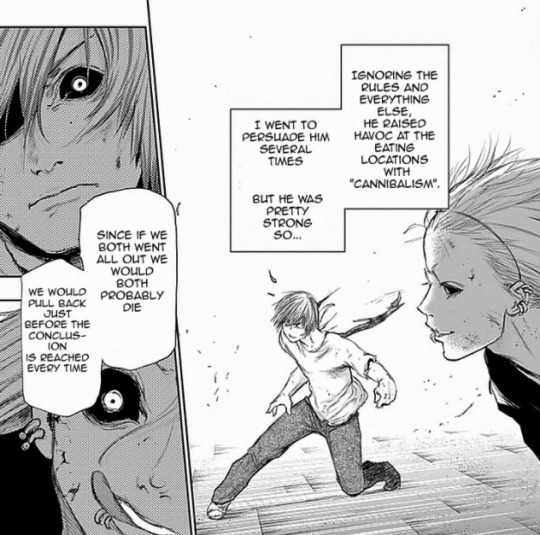
Every single time they got close, they would both pull back because they were too afraid of dying. Their relationship is the same, they could be friends but both of them are too afraid of pulling close. To this day Yomo only barely admits that Uta is a friend, and keeps him as distant as possible. Uta at the same time makes no attempts to get closer because he prefers staying on the edges.
Yet neither of them can be entirely divorced from one another either. The two of them both continue to associate with one another, Uta even went so far as to save his life even though they’re now on opposite sides of a conflict.
I can live neither with you, nor without you. Neither of them can bring themselves to kill the other, but they also don’t want to get close enough to understand each other, because Yomo defines himself entirely by his loss, and the few small family members he has left and Uta defines himself entirely as a reprobate sitting on the outside of things.
In order to actually get close the both of them would have to broaden their horizons, which both are too cowardly to do.
Which is why Yomo really can’t win in this situation either. In a manga about understanding and empathy and unerstanding, you can’t defeat an enemy you don’t understand at all, and also have refused to even try to understand up until that point.
#tg meta#donato porpora#meta#koutarou amon#amon koutarou#yomo renji#uta#tokyo ghoul meta#tokyo ghoul re#tokyo ghoul theory
402 notes
·
View notes
Text
Psychological Impact of Lockdown & Conflict on Kashmiri Children
Armed conflict in Kashmir has a detrimental effect on all the inhabitants of the valley but children, undoubtedly, fall in the most vulnerable category. Some of the immediate targets in the life of a child who is exposed to an environment of conflict are the health aspects, which are, in my opinion, the most significant ones for a child to develop into a productive adult. Firstly, and at the physical level, the health of our kids is crippled by the armed conflict; with over 300 children killed merely since 2003, thousands maimed forever and numerous blinded. The pattern clearly shows how children were direct targets of state violence, as part of its stated offensive to curb the uprising in the state.Secondly, if by chance the child survives, he is inflicted by those silent, torturous weapons! Yes! I am talking about the silent, but excruciating mental scars. With each passing day, the conflict in Kashmir is developing negatively from bad to worse and excessive use of armed forces, torture and of course injustice are the factors to blame. Children, being young and unaware, have been and remain one of the worst affected social groups in the ongoing conflict. While adults are busy surviving, schools and playgrounds that were supposed to be the places for children to play, are damaged and more often than not, taken over by the forces. Another aspect is that in a state afflicted with conflict, child rights are violated on a massive scale and it passes as “almost normal.” Thousands of children in Kashmir are affected and that too, beyond any healing. At a tender age, they are confronted with physical harm, violence, danger, fear and loss. At the time when they were supposed to learn the first Kalimas, they learn the Dua’as of Maghfira. When they were supposed to play with toy guns, they witness real guns that have killed their families before they could know them. Paranoia grips their tender psyche and just when they reach a barely teen age, they are forced to rebel. It’s a vicious circle of exploitation. The impact of the ongoing conflict on Kashmiri children has received a little or, let’s say, no attention so far. While parents want and try their best to provide a safe and secure atmosphere for their children to grow up in, unfortunately, in Kashmir, they have to bury the hatchet of wanting to see their children flourish.Thousands of Kashmiri children have already lost their childhood to the turmoil and the violence. And with each bullet and each tear gas shellfire,the number only keeps mounting. George Orwell once said “War is peace. Freedom is Slavery. Ignorance is strength.” That is precisely what is happening in Kashmir. The effects of war are so severe that over the years it has affected generations of children so harshly, twisted their thought process, their emotional and psychological capabilities so severely, that this troubled state of oppression and war crimes has become the new normal for our young ones.The conflict has mentally disabled generations of children and young people beyond any repair for the rest of their lives. The consequences are endless, but to name a few, hundreds, even thousands of children are exposed to high levels of stress which results in disorders such as Hysteria, Post-Traumatic Stress Disorder, Acute Stress Reactions, Anxiety, Psychosis and Depression. Coping strategies, unfortunately, are not many. And children forced to grow up before they earlier had to, render to substance abuse to calm their senses down superficially or even choosing a more lethal path- that of armed rebellion. Again, a never ending circle that only has one end- Death. I believe that Kashmiri children suffer from direct alterations in their personalities, identities and behaviors every day. Each gun shot fired brings them a step closer to PTSD. Each banging on the door increases their count of nightmares. Each window pane broken shatters their idea of living in a peaceful society. Each night protest makes their insomnia more severe, each security raid, each dead body witnessed sinks their mental health further.If we examine, our children, barely after their toddling age, have “HUM KYA CHAHTAY? AZAADI!” on the tip of their tongues. Bring me one single child from the valley who doesn’t have the slogan memorized and I’ll be damned! Even though our children don’t know the actual meaning of what they are saying, yet, they imitate what is reverberating from each nook and corner. Initially, in imitation, a child, barely in his pre-teens, would simply go out and join the crowd and say, “Everyone is on the street and pelting stones, even my friends are doing the same, thus, I did the same.” What maybe enjoyed as a light day of a strike call and happily accepted absence from school, used up in throwing stones for fun, or at times, to even release the young fury in their tender minds, is actually a price heavily paid to the boiling pot of conflict in disguise. We are sacrificing both our, and the peace of mind of our children, sacrificing our jobs, our earning, the education of our children. We are, moreover, sacrificing our lives. Our children might not have inherited our culture or our religion, but they sure have inherited the conflict. In their minds, the songs of freedom are playing, as you read these words, on loop. However, contrary to what one might assume, the songs are filled with tunes, rather, blasts of gunshots and hues of blood. One similar song reverberates in my mind as I’m writing this… “IN SPRING THE FLOWERS BLOOM; OURS DIE.” The children of this Paradise on earth feel cramped, shut in a hovel, and imprisoned in their own minds wherein insolent doubts and fears make up the bars of the prison. Lastly, I would once again say that our children are facing the brunt of this conflict. They have lost their childhood, their innocence, their hopes and even their ability to dream. Worse is, they will continue to be victimized until an unanimous and peaceful resolution is not passed to settle the Kashmir issue down. Now, let’s approach the idea of what can be done. I know many of us bring the facts to the surface but most of us don’t actually do much afterwards. The solving of the conflict is long term. What can be done immediately? That’s precisely the question we are working upon. JKCCS (Jammu & Kashmir Coalition of Civil Society) has advocated for human rights in Jammu and Kashmir for nearly two decades. Its area of concern covers the whole conflict. Right from arbitrary detentions to ceasefire line killing to take encounters and so on. As a coalition of civil rights groups, Its work is to speak truth to power and confront the State and its violence. It believes in collective unity and our aims of making the Valley of Jammu and Kashmir a better place for the people residing here, striving hard to work towards providing all the internationally guaranteed civil, political, economic, social and cultural rights including the right to self-determination remains our basic agenda. As far as the children of the valley are concerned, JKCCS recently released a report titled “Terrorized: Impact of Violence on the Children of Jammu and Kashmir”. The report is the assessment of the violence against children in Jammu and Kashmir in the last fifteen years i.e. (2003 to 2017) and gives data on killings, arrests, mass violence, sexual violence perpetrated against children. The report provides statistics, graphs, figures, and the analysis of killings of children in the last fifteen years (2003 to 2017) in various incidents of violence in Jammu and Kashmir. The report lays bare that there are no legal and normative processes or practices protecting children’s rights in Jammu and Kashmir as hundreds of minors have been booked under the repressive Public Safety Act (PSA), with total disregard to the fact of their being children. We do understand that children are the building blocks of our society and they need to have a childhood of peace and tranquility. Not one spent under the shadow of guns and grenades. We need scaled-up responses to improve psycho-social well being of our young ones before further generations. I would conclude this with a quote, Benjamin Sáenz once said, ‘The heart can get really cold if all you’ve known is winter.’ The conflict has set somber clouds of grief over our skies and it doesn’t look like either us, our children will witness spring anytime soon, but the least we could do is to stop our hearts from freezing and becoming indifferent to the suffering of our own people and get united against these perpetual war crimes and child abuses. We need to do our service to our state. A long overdue, service. As I conclude this, I hear the noise of security helicopters hovering in the night sky above me. Patrolling for us? Patrolling us? No one really knows. Author studies Law and is a founding member of MASHEK, an NGO for the children of conflict. Article written by Ovais Karni. He can be contacted on Twitter @OvaisKarni This is an independent opinion article. The Wrosper is not responsible for the content of the article. Read the full article
0 notes
Link
News
The Satoshi Revolution: A Revolution of Rising Expectations Section 4: State Versus Society Chapter 9, Part 7 The Jiu-Jitsu of Crypto: Personal Freedom vs Social Change.
It is often assumed that power derives from violence and can be controlled only by greater violence. Actually, power derives from sources in the society which may be restricted or severed by withdrawal of cooperation by the populace. The political power of governments may in fact be very fragile. Even the power of dictators may be destroyed by withdrawal of the human assistance which made the regime possible.
–Gene Sharp, The Politics of Nonviolent Action
Cryptocurrencies withdraw assistance from the state’s engine of power: the financial system. But they do more. They create a parallel payment and monetary system that draws upon the state’s own energy to defeat it.
The Japanese martial art of jiu-jitsu is a method of defeating an armed opponent in close combat, even though the defender is unarmed. The attacker’s force and power are used against him. The defender never directly confronts the attacker with opposing force. Jiu-jitsu is an art of self-defense in which the attacker is not the opponent; his movements are.
Bitcoin defeats the central banking system even though crypto has no force of law or standing military with which to directly confront the attacking banks. Instead, crypto feeds off the backlash of discontent created within society by the corruption of the financial system. Crypto’s strength as a freedom tool lies in its role as a parallel system, which revolutionizes payment and monetary systems to eliminate the state and banks as trusted third parties. It recognizes these parties as armed opponents in close combat. In short, crypto uses the arrogance of the central banking system to good advantage by attracting the rebellious and disillusioned within society to engage in financial self-defense.
This current strategy of jiu-jitsu confronts two obstacles, however.
One is the state. Or, rather, it is users and institutions who view crypto as a type of new fiat, not as a vehicle for freedom. They view exchanges as a new type of traditional bank that is geared to handle an innovative specie, in much the same manner as credit card companies handle a different type of transaction. These users want state involvement because it brings “respectability” and the safety they believe a trusted third party can provide. To them, those who prattle on about freedom are irritants or troublemakers who hinder the true future of crypto.
The second obstacle to a jiu-jitsu strategy is an alternate manner of addressing the state: confrontation. This strategy has its time and place-generally as a last option-but it is in conflict with the self-defense tactic of waiting for an opponent’s movement and drawing upon it for strength. Direct confrontation relinquishes the jiu-jitsu advantage. Julian Assange and Satoshi Nakamoto clashed about their attitudes toward bitcoin when Assange flaunted the crypto as a donation method to the otherwise financially embargoed Wikileaks. Theirs was a clash of strategies for freedom: confrontation versus low-profile growth. Assange crowed, “Bring it on!” to government officials; Satoshi recoiled because the prominent bravado endangered the quiet paradigm that was replacing the dominant one by exploiting the latter’s weaknesses.
A fist of defiance thrust into the air is emotionally satisfying, to be sure, and it may be appropriate in some circumstances. But those who want crypto to become a part of daily life should ask: is the goal to be free, or is it to vent? Is it to construct a different society, or is it to rail against the current one? There can be real tension between these goals. Crypto is not big enough or powerful enough to win in a face-to-face conflict with the state, especially if the battleground and weapons are of the state’s choosing. The state excels at brute confrontation. Crypto’s advantages differ: it is fast on its feet; it is incredibly inventive; and, it draws on the state’s weaknesses as well as on its power. By commandeering the animosity and corruptions that banking creates, a David and Goliath scenario plays out in which a diminutive but nimble challenger defeats a lumbering giant.
What Strategy is Optimal? Personal Freedom vs Social Change
The “best” strategy-if only one exists-depends on the goal being pursued.
Those who view crypto as an investment or as a paternal twin of fiat will embrace the state. Those who view crypto as a path to personal freedom will avoid the state whenever possible. The situation becomes more complex if the goal of social change is added to the mix. Although personal freedom and social change are intimately-related concepts, they are also separable. Those who seek social change may well engage in the high-profile rebellion that can be anathema to personal freedom.
Personal Freedom. Bitcoin was designed to free individuals. Its emphasis on privacy and pseudonymity allows people to navigate the financial world with unprecedented autonomy. Governments may loudly announce that they can crack transactions wide open, but they are scrambling, with no clear idea of how to handle mixers, tumblers and the other privacy innovations. Crypto advances more quickly than repression can, and governments—like bullies—are often loudest when they are impotent. If governments could kill the independence of crypto, they would have done so already. As it is, they fall back upon a standard method of enforcement: intimidation. The next step is open violence, the last resort of the state, which prefers to operate as though consent were present. Open violence means social control has failed, and no other alternative is available.
Social Change. Traditionally, social change involves an entirely different dynamic than personal freedom. The reform-minded individual does not seek privacy or avoid the state because the established strategies of social reform require visibility and confrontation. Public speeches, protest marches, petitions, guerrilla theater, editorials, sit-ins, boycotts, buycotts, pamphlets and books, civil disobedience…these strategies aim at raising a social issue to such prominence that it can’t be ignored but must be addressed.
Catching the state’s attention is dangerous. Its first reaction to an effective challenge is usually repression. That’s why those who engage in nonviolent action often go through training on how not to react to a backlash-how not to react to police attacks, for example. Social reform can be a dangerous business.
Cryptocurrencies have a valuable edge over traditional social-change approaches. Instead of being convinced to confront and resist the state by raised their political awareness, people use crypto out of rational self-interest; they avoid the state for the same reason. Traditionally, social reform seeks to change the hearts and minds of people, one by one, until there are enough people to create a tipping point at which society itself is altered. Crypto seeks to change people’s perceived self-interest, one by one; self-interest is a far more prevalent and accessible motivation than social consciousness. (The preceding statement is cynical only to those who hold a negative view of self-interest.) When a sufficient number of people prefer crypto over banks, and crypto over fiat, then society will have changed…without violence, without martyrdom, and without courting danger.
How many individuals must be “converted” before a society is reformed? No one knows. But the success of freedom or of repression does not seem to require large numbers. The Christian anarchist Leo Tolstoy observed,
“A commercial company enslaved a nation comprising two hundred millions. Tell this to a man free from superstition and he will fail to grasp what these words mean. What does it mean that thirty thousand men…have subdued two million…? Do not the figures make it clear that it is not the English who have enslaved the Indians, but the Indians who have enslaved themselves?”
Equally, many revolutions have been led by a handful of believers who tapped into strong emotional currents of the people, such as the hatred of corruption and a desire for a better life.
A tipping point is not a measurable dynamic. This may be especially true of crypto because so much of the activity and so many of the people are low profile. Typically, activists look over their shoulders and notice that a significant change has occurred. Then they say to themselves, “That was it—three months ago.” Radicals have debated what the “tipping-point” is for centuries. Ninetenth-century individualist anarchists in America believed that laws became unenforceable if ten percent of the people refused to obey them; that is, the laws became “dead letter,” which is just as effective as repealing them. An entire system can also become unenforceable.
At that point, of course, the topic is no longer social change. The topic is revolution.
[To be continued next week.]
Reprints of this article should credit bitcoin.com and include a link back to the original links to all previous chapters
Wendy McElroy has agreed to ”live-publish” her new book The Satoshi Revolution exclusively with Bitcoin.com. Every Saturday you’ll find another installment in a series of posts planned to conclude after about 18 months. Altogether they’ll make up her new book ”The Satoshi Revolution”. Read it here first.
0 notes
Text
2016
The End of an Era … for White Males |
http://foreignpolicy.Com/2016/01/25/the-end-of-an-era-for-white-males/
As demographics change, so does the definition of privilege.
BY DAVID ROTHKOPF
David Rothkopf is visiting professor at Columbia University's School of International and Public Affairs and visiting scholar at the Carnegie Endowment for International Peace. His latest book is The Great Questions of Tomorrow. He has been a longtime contributor to Foreign Policy and was CEO and editor of the FP Group from 2012 to May 2017.
JANUARY 25, 2016
White men have had a great run. From the rise of the Greeks to the birth of Western-based global empires, they have controlled much of the world or sought to: So much of history is a consequence of decisions made by—and at the behest of—the white guys in charge. Several factors are contributing to making this historic moment a watershed in global history. First, there is the rise of the emerging world, notably the economies and societies of Asia. While the planet has always been home to great nonwhite civilizations, such societies have ebbed and flowed in relative importance. Today, it is clear that these emerging societies, namely China and India, are on the rise. So too—thanks to economic and political reforms, technological and scientific progress, and the advent of the connected world—are other great and rich cultures from the Middle East to Africa.
In addition, millennia of repression of women’s rights are coming to an end. Not fast enough. And not everywhere. But in much of the Western world, once male-dominated domains are now populated by more women than ever before, and this trend shows no signs of reversing—thankfully. Not only that, but around the world women are empowering other females, including girls, to lead in technological fields in the Digital Age. Quite simply: It now seems to be common sense that no society can thrive if it fails to tap the intellectual, economic, creative, and spiritual resources of its entire population. Finally, thanks to the mobility revolution of the past century, flows of refugees and migrants of all kinds have shifted the demographics of societies and—protests and unease aside—they have proved essential to fighting the demographic trends, such as aging, that have put many advanced societies at risk.
Inequality, injustice, and, frankly, fatigue have led populations to seek other choices. Further, the societies that have given the white man his greatest influence in the world—those of Europe and the United States—are struggling in key respects to maintain their global influence. Economic pressures weigh on them. Political divisions are a drag on their growth and ability to act.
As history has illustrated, it’s hard to stay on top for an indefinite period.
The result is that the status quo of the past several millennia is going to undergo a profound change. In Europe alone, the influx of migrants and refugees is already producing irreversible demographic shifts—a great blending of cultures. But by mid-century in the United States, the former majority population will be a minority: The majority, according to demographers, will be nonwhite. By that time, Europe will include massive populations from Africa and the Middle East, as well as Asia. This is to say that by 2050 white men will be the ones checking the “other” box on census forms.
In fact, it is this idea of “otherness” that is going to undergo the greatest change. A current subject of hot debate, such othering has been used by some as a tool for fear-mongering against migrants, immigrants, and refugees—an approach linked, of course, to nothing but ignorance and intolerance. (Attacks on America’s first black president had similar origins and took on a similarly ugly tone.) Whether the threat is one associated with Islam or extremism or simply economic competition within a country, the reality is that the expressed fears are way out of proportion with the actual, manifested threats.
A shrink I knew once said that if a reaction is out of proportion with its alleged cause, then there’s a piece of the story that has been omitted. In this case, the politicians in America and Europe who spew nationalist bile and fan the flames of anti-immigrant furor are tapping into a growing if unconscious cultural recognition that time is running out on what has been the world’s most privileged ethnic class.
Of course, human mobility is not something to be fought, but rather something to be embraced. While belonging to a community is wired into our DNA for reasons linked to the survival-based social units of our most ancient ancestors, the story of civilization and progress has been one about the blending and reblending of those units.
There are two key lessons here. The first is that, given the fact that civilization is a safer, happier, healthier, richer, wiser place today than it has ever been, the sharing of ideas and values and cultures, it seems, has actually been for the better. For the United States, this is illustrated in its history: Since the early 19th century, new groups have entered the country and have been resented and resisted—the Irish, Italians, Eastern Europeans, Jews, you name it. Yet over time each group has made huge contributions to the United States, a country that only grew stronger with each wave of new blood and new ideas.
The second key lesson is that there is an alternative to “other” and that is “all.” Rather than focusing on our differences as the smallest and most dangerous of our political leaders have done, the real leaders for this new era will distinguish themselves by focusing not just on the social diversity that makes great nations, but on the truth and wondrous benefits of the diversity that actually lives within us all.
As the nationalists, white supremacists, and idiot hordes who follow them have sown seeds of division in the wake of new human flows across borders, the tragic irony has been that they, in fact, have ended up embracing precisely the same kind of intolerance that is the stock in trade of their avowed enemies. What we need instead are those who will stand up and say, “No. You have it wrong. Diversity is not the threat. It is the answer.” That is, in fact, what has made America and every diverse society great. To be sure, we should not—not for one minute—lament the passing of the white-male era, for there is at least a glimmer of hope that soon to come is the era of “all.”
Illustration by Matthew Hollister
OBSERVATION DECK Farewell to Arms Has American fiction lost its political edge?
BY ADAM KIRSCH
Adam Kirsch is a poet and critic. He is the author, most recently, of Rocket and Lightship: Essays on Literature and Ideas.
JANUARY 22, 2016
In an era of ideological polarization and violent extremism, American readers are showing a hearty appetite for nonfiction books that deal with urgent social and political issues—works such as Ta-Nehisi Coates’s Between the World and Me or Jill Leovy’s Ghettoside, a report on the murder epidemic in South Los Angeles. Yet some literary critics are lamenting that Western novelists are sitting out the wars. Instead of confronting the world as it is, they are retreating into imaginary realms of their own.
Last May, for example, British-born writer Aminatta Forna delivered a speech in Boston in which she asserted that writers from Turkey, Bosnia, China, and Russia addressed the politics and current events in their countries “because it mattered.” It was impossible to live in these places, she argued, and not realize that the destiny of individuals was shaped by history. By contrast, she said, “a Western readership tends to be far more interested in the interior worlds of writing and reading. Writing is perceived as a private battle with the individual consciousness.” American novelists, in her view, set the aesthetic in opposition to the political, afraid to let the big, messy world invade their walled gardens. It’s true that most American novelists are not writing works like those of John Steinbeck, Upton Sinclair, or Ernest Hemingway—authors who confronted poverty, corruption, or battlefield carnage with realistic depictions of events that they witnessed. But this doesn’t mean that American writers have abandoned political fiction—what critic Lionel Trilling once described as the “bloody crossroads where politics and literature meet”—or that they are indifferent to the world at large and their place in it. Rather, they approach these subjects with a humility born of the knowledge that literary fiction, in the United States today, is the concern of a small, generally like-minded readership.
A literature that recognizes itself as disenfranchised, powerless to shape public debate, will approach politics in more idiosyncratic ways.
The fact is that, ever since planes crashed into the World Trade Center, American novels have been unable to avoid politics, and novelists have provided crucial insights into the political temper of the moment. Jonathan Franzen’s Freedom, one of the most acclaimed and best-selling literary novels in the past 15 years, is explicitly about the Iraq War, which he portrays as morally corrupt, and the environmental movement, which he sees as a noble if likely doomed effort. Franzen, however, is an exception. For the most part, when American novelists address political subjects today, they do so not through realism, but through flamboyant, genre-bending fiction.
This approach flourished in the wake of the 9/11 attacks and the 2008 financial crisis, when what had once seemed to be unshakeable pillars of American existence—physical security, economic prosperity, world primacy—began to teeter. A future historian who wanted evidence of how these events affected the American psyche would have plenty of novels to choose from. In Gary Shteyngart’s Super Sad True Love Story, for instance, a near-future America is embroiled in a losing war in Venezuela and is so crippled by debt that China has taken over the economy. The lovers at the center of the book are both first-generation Americans—Lenny’s parents are from Russia, Eunice’s from Korea—but they live in a country that is no longer rich or powerful enough to make their American dreams come true.
By unwriting the classic immigrant story in this way, Shteyngart gives a powerful sense of American loss of confidence—and that’s even before he depicts the Army massacring civilians in Central Park. Shteyngart’s technique is to take real political and economic trends and blow them up to cartoon size, which makes them both less threatening and easier to perceive. He is far from the only writer to address real-world political anxieties in this way. Jonathan Lethem does something similar in Chronic City, which depicts a New York City where a permanent fog has settled over Wall Street and residents are terrorized by a wandering tiger. In Nathaniel Rich’s Odds Against Tomorrow, the city is destroyed by a massive flood; in Colson Whitehead’s Zone One, it is overrun by zombies. Claire Vaye Watkins’s highly praised new book, Gold Fame Citrus, gives Los Angeles the same treatment, imagining a city obliterated by drought and desertification.
These novels don’t document political events in a directly reportorial way, as some American authors have in the past and many writers elsewhere still do. But it would be a narrow definition of political writing that dismisses such nightmare visions. Whenever a writer is engaging imaginatively with the state of the world, she is writing politically, even if she never uses the words “Republican” and “Democrat.” So much is clear in quieter novels like Teju Cole’s Open City, which follows a Nigerian-born doctor in his wanderings around New York City and Brussels, and Ben Lerner’s 10:04, whose autobiographical narrator lives through Occupy Wall Street and Hurricane Sandy. Both of these books are narrowly focused on the experience of one introverted and intellectual protagonist, yet they show how the big events of the times inevitably color our private lives.
In truth, this is the way most Americans actually experience politics today: learning about war, displacement, and climate change at a remove, from TV and newspapers; dreading disasters that loom just over the horizon but never quite arrive; and feeling acutely their individual powerlessness in a mass democracy, where the voice of one person, no matter how impassioned, seems helpless to effect change. In writing about politics and history as they do, American novelists are not shirking their responsibility, as Forna and other critics might suggest; they are producing a faithful record of how it felt to live in their time and place.
Readers of the future who want to understand how Americans experienced this age of terrorism, war, and ideological mistrust will be able to turn to fiction for insight. They will find that, in America today, the crossroads of literature and politics is not as overtly bloody as it once was, but that it is still a dangerous place.
Illustration by Alvaro Dominguez
About David Rothkopf
David Rothkopf is visiting professor at Columbia University's School of International and Public Affairs and visiting scholar at the Carnegie Endowment for International Peace. His latest book is The Great Questions of Tomorrow. He has been a longtime contributor to Foreign Policy and was CEO and editor of the FP Group from 2012 to May 2017.
@DJROTHKOPF
Aug 19th, 2017 1:35:11pm
0 notes